#(which is a deliberate characterization device and I am here for it)
Explore tagged Tumblr posts
Text
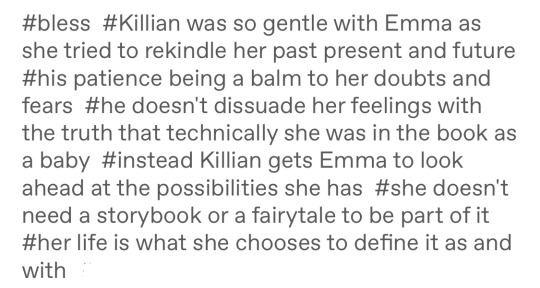
@priscilla9993’s tags are impeccable
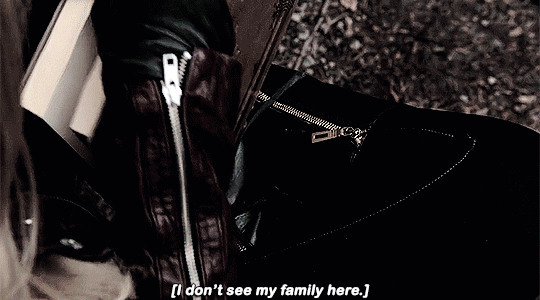
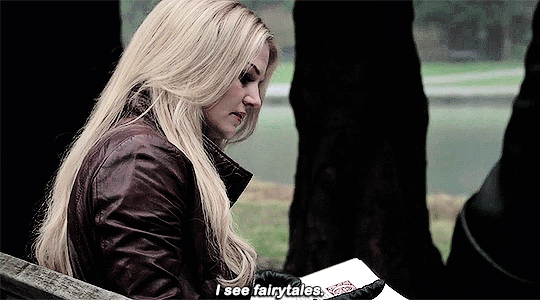
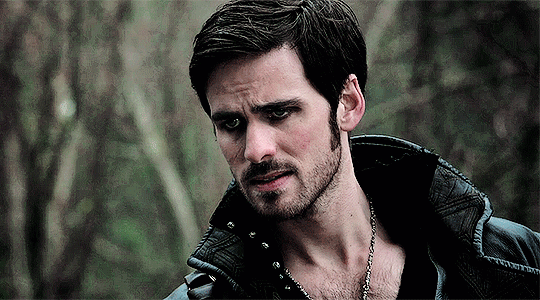
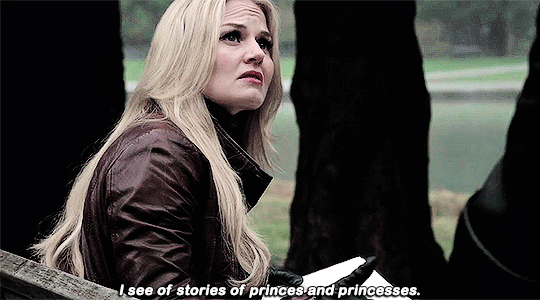

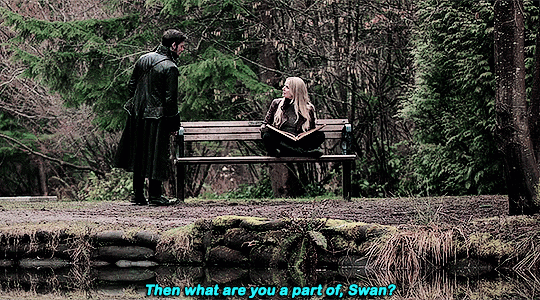


favourite ouat scenes: 77/?
#obsessed with this interaction. what a beautiful heartfelt way to kick off the captain swan movie#prev tags are sooooo right#once upon a time#ouat#captain swan#I do love that Killian doesn’t negate any of the things Emma says. I love David but especially early in his parenting he tends to do this#(which is a deliberate characterization device and I am here for it)#instead he gently probes for more information on her perspective#also one of the most enduring tragedies of ouat#is the fact that Emma who grew up feeling so unloved and unwanted#was in fact the product of true love and was SO wanted and loved that her parents sacrificed everything to save her#and it’s something they spend much of the series reckoning with and it’s so poignant#question - if she had gone with them to storybrooke in the curse -#would she have been stuck as a newborn for 28 years? 🤔#probably something you shouldn’t think too hard about lol
239 notes
·
View notes
Note
hello angie i hope this letter finds u well and my inquirie wont be too much trouble for u!
i recently finished jane austen's persuasion and it was a very lovely book. while i was aware of the central theme n tried to take note of the various instances of it perhaps to think of what they said at a later time, i realised i was not veyr sensitive about other aspects of the book. i rlly enjoyed reading the intro which wrote abt austens techniques and portrayals of various themes in the book such as the moral implications of persuasion (and of being persuaded) as well as the pov of the book being squarely within the protagonists senses + head (which creates a lot of intimacy n a unique situation + how characters are portrayed)
and i always find myself enjoying these insights be it articles about an up and coming poet's smart use of auditory imagery, rhyming or an intro about the problematic nature of Shakespeare's plays, but i always realise i never come to these realisations by myself!
the point is i find im not very sensitive or good at noticing details when it comes to literature... as a literature major yourself and prolific reader do u have any advice on how i can become more observant so i can form nuanced readings? (since i could find nothing on the internet)
Hello dear Lab ^_^ i am very berry flattered that you came to me with this question, and that you consider me a capable enough person to answer it! These few pieces of advice that I can offer you are a mix of what I learned in college and my personal experience reading and writing...☺️
My golden rule of reading: QUESTION EVERYTHING! I'm oddly enough the sort of person who naturally takes things at face value, so questioning the "sanctity" of the author's word wasn't always easy for me, but as I started writing myself and becoming aware of the literary devices and procedures that I use myself, I became more attentive of how authors bigger than myself do so too! When I say question everything, I really mean everything: the characters' words - I feel like people in fandom spaces forget way too often that fictional characters can lie, or obscure their true feelings, or simply be unaware of their true feelings up to a certain point. The setting of certain scenes - we had a very eye-opening lecture last year about how characters can be characterized by the environment around them, and while movies and plays are the first thing that come to mind when I say "characters' emotional states can be represented by the landscape and the room around them", it's something that I always pay attention to in literature as well. Forgive me for using my own work as an example, but I find it the easiest to explain like that - think of the beach house by the suicide cliff in BSCTTD! I tried very hard to make that house not only a house, but a representation of a certain defeated state of being. In works of literature better than my own, you'll find this even more often - if a good author points anything about a character or the room out, you should question why they chose to do so and what effect it has, what sort of a sensation that awoke in you! The same lines of dialogue can come off a thousand different ways based on the way the scene moves between them!!!! It's so interesting! The next thing you should question in the story is TIME! What order is the story told in, linear or nonlinear? If it's nonlinear, the order of the scenes is surely deliberate. If it's linear, that is surely deliberate too - perhaps because the crucial thing here is observing the character's growth or decay in real time? Does the author specifically slow time down at certain scenes, or keeps coming back to them? There are a thousand beautiful ways to manipulate time and perspective. Something that comes to mind is a scene from Madame Bovary where Emma suddenly experiences a scene of observing the landscape of the city from a carriage as though it's happening for the first time, even though it's something she's seen many times before, or on the other hand a scene from a Croatian novel called U Registraturi that repeats the scene of the character losing his virginity twice, once early on in the book in a sort of a flash-forward way, and then later on as it actually happens. Choices like these certainly not only make the story more dynamic, but also drive us to ask ourselves WHY!!!!!!! I'm sure there are a thousand answers a thousand people could offer, and that's the beauty of reading. NOW... Perhaps the most interesting thing to question is the problem of perspective! When I was young, I troubled myself a lot by asking "why did the author choose to make this character the POV character and not someone else? Why not the villain? Why not the girl? While everyone's perspective could surely bring something fresh to the story, or even weave an entirely new story, the choice of POV characters is always very deliberate. I like to ask myself, why them? What would change if it were not them? If I saw them from an outside perspective? Am I empathizing with them? Why, or why not? How close is the narration to the character themselves? There's so much to think about, everywhere, all the time!!!!!!!!!
I'll try to summarize the key points to think about while reading:
- Characters (their traits, the ones that are specifically said about them, the ones that are only implied, and how they contradict each others. Their name, living space, possessions... The relationships between characters and how they parallel each other)
- Time (already elaborated above)
- The Narrator (Are the narrator and the POV character the same, or is the narrator a separate entity? How much does the narrator "butt in" with their own opinions? Are they reliable?
- Perspective (elaborated above)
- The historical context (I'm not saying you have to do exhaustive research every time you read an older book, but since I had a subject about literary history where we very pedantically went through every stylistic period, I find it really interesting to do some reading about what conventions were popular at the time when a work was written, how it fits into them or does not fit! It also helps a lot with learning how to read more critically!)
You also mentioned poetry, and I just realized all my advice is pretty specific to prose... I think when it comes to poetry, sound is god. It helps me to first read a poem, and then listen to it out loud (looking for a recording or reading it to myself if I can't find one) and trying to figure out how the sound and the images complement each other! Poets are usually seeking the right sound rather than the right visual scene, but it's a snake eating its own tail. I feel like the shorter the poem is, the more difficult it is to read with understanding, so I truly admire people who can write good short poems...
That's it from me for tonight, I hope it was not disappointing! If I come up with something else, I will message you! Let me know what other things you read and how you like them, I love hearing it!
8 notes
·
View notes
Text
“Beyond its obvious preoccupation with the metaphysical, The Stand also explores how personal beliefs (moral, political, and religious) are manifested in compromised and unprecedented social and political situations. The politics don’t kick in until the novel’s about half-way through, and it’s mostly through the character of sociologist Glen Bateman that King explores questions about social organization and the assertion of political authority that organization seems to demand. What happens, King asks us, when a society collapses? Given the opportunity to create a new social order, what rules would you choose? In my Jurisprudence, Law, and Society course, I often challenge students to tell me what five basic laws they would impose upon a newly-established colony on Mars. The less-intrepid repeat Sunday school-type moralisms (“thou shalt not steal” and the like) while the more nimble thinkers suggest procedures for ruling and further rule-making, whether felons should be denied the right to emigrate, what kinds of health requirements should be imposed, and whether or not colonists should be screened for illegal drugs. In other words, these students are not as concerned with laws that regulate behavior, but with laws that determine membership and laws that regulate how to make other laws. Obviously, these are fundamental question for political philosophy, and The Stand explores these when the “good” citizens of Boulder organize to deliberate about how their new society ought to be organized and governed as they transition out of what Thomas Hobbes and John Locke call a “state of nature” or the absence of government.
As every student of political philosophy knows, these 17th century thinkers both used the hypothetical state of nature as a heuristic device for understanding why government and authority are beneficial for human beings. For Hobbes, human life without authority in a state of nature is free, but it’s also “solitary, poor, nasty, brutish, and short” because humans are constantly at war with each other over resources on the one hand, or just because of human avarice and greed on the other. Even an overarching or dictatorial state is better than anarchy, so fearful people give up their liberty and entrust it to their government as a way to preserve their own self-interest. For Locke, the state of nature’s actually not that bad: human beings enjoy extensive liberty as ‘self-owners’ and through this they gather together nature’s abundant land and other resources in order to produce goods for the benefit of themselves and others, which they truck and barter for through mutual assent or contract. But Locke recognizes that some people (we’d call them thieves) will not respect the property of others, and despite the fact that each individual in the state of nature is justified in punishing (and even killing) those who transgress against them (or others), this will inevitably lead to blood feuds, revenge killings, and eventually the kind of chaos Hobbes thought would characterize the state of nature. Like Hobbes, Locke thought that individuals give up their individual liberty to the state (here, it would be the liberty to punish), but, contrary to Hobbes, Locke argues that this is because of purely rational considerations such as the need for fair and neutral judges and the establishment of a reliable legal system. (He also talks a lot about God, which I am going to sidestep here).
For The Stand and its extended meditations on good and evil, what’s interesting about the Hobbes/Locke debate about the origins and justifications for government is their underlying metaphysical assumptions about human nature: for Hobbes (whose view of human nature and political organization is echoed in Flagg’s totalitarian Las Vegas), the human being is basically non-moral, unreasonable, and motivated purely by fear and self–interest. Locke, on the other hand, believed that human beings were essentially good-natured, rational creatures who, given the right circumstances, would improve their own lot while also improving that of humankind: cue Abigail’s Boulder Free Zone colony. This debate plays out in The Stand’s final confrontation between good and evil, a literary representation of a battle that, contrary to Hobbes’ and Locke’s more rigid categorizations, probably plays out in every human being based less upon ‘human nature’ than upon their upbringing, socialization, and material circumstances in terms of adequate nutrition, shelter, emotional support, and so forth.
It’s here, I think, where both Hobbes and Locke fail in their attempt to make the state of nature thought experiment work, and where it perhaps also fails in The Stand: the individuals who populate the various states of nature (that of Hobbes, Locke, or King) are always already socialized by their community––perhaps the better term is pre-socialized. Admittedly, the state of nature is hypothetical––there’s no actual state of nature now, and there never was one in the past––but it only works as a thought experiment and learning device if the hypothetical people in it act like real people. Unless they are Tarzan or they were raised by wolves, all human beings are socialized by a community of other human beings. No human being––even a hypothetical one––bursts out into ‘nature’ and then behaves like Hobbes or Locke says they do. They are going to behave, for better or for worse and to varying degrees, within the general boundaries of their community, and it is only a pathological human being who lacks community. The worst offender here, I think, is Locke, who argues that a single, autonomous individual can justify their spontaneous acquisition of a part of the state of nature (their property) by “mixing” their labor with it. Somehow, the other people mulling about simply know that they ought to respect another’s property by not taking it by force, and that the proper way to transfer the property is by contracting for it. In Locke’s nature, people don’t learn this: they just do it.”
3 notes
·
View notes
Text
Day 44: Preoccupied about the same things as Trolls, revisited
Welcome back y’all! Before we get into this, I want to talk about the Condesce/Meenah as a parallel character to Mom Lalonde/Roxy. You can read a bit about @mmmmalo‘s takes on Openbound, and why they think that Meenah is symbolically Roxy’s Doppelganger here.
I want to call attention to some specific similarities between them, and while I think it’s a bit of a stretch, Homestuck draws parallels between characters all the time.
Both the Condesce and Mom Lalonde are matriarch figures estranged from their potential offspring by dire circumstances and servitude to a patriarchal authority and his time-spanning plan - for the Condesce, that’s English obviously, but for Mom Lalonde, that’s Grandpa Harley - servitude to his design renders her a wreck of an alcoholic forced to endure the end of days with no means to stop them from happening, living with a daughter who wants nothing to do her.
Both Meenah and Roxy are rebels against a repressive order, inclined to shirk their assigned Role in service to someone else’s master plan, but ultimately, through some roundabout means or another, give service to it anyway (for Meenah, scratching the game, and ultimately ending up English’s glorified slave for eons in the end; for Roxy, at first refusing to play Sburb in hopes of spiting the Batterwitch, but ultimately ending up playing into her schemes anyway).
They are both rebellious spirits who are repeatedly forced to participate in Paradox Space’s Alpha Timeline all but against their will by hegemonic forces, slaves to a system that they exist in perpetual rebellion against, and by the end of the comic, they both get to help strike a decisive blow against the ultimate foe. Unfortunately, unlike Roxy, Meenah is ultimately the kind of person who chooses at practically every occasion to continue cycles of abuse instead of breaking them. There is ultimately no possibility of reconciliation between these estranged sisters.
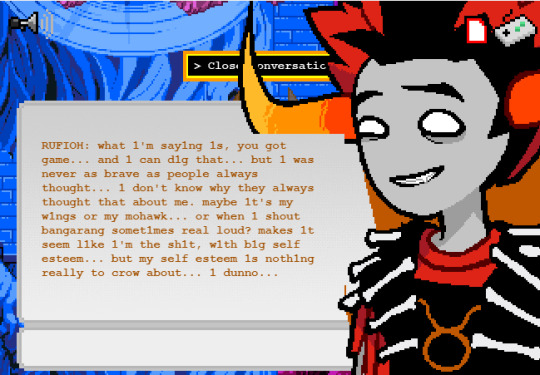
So, I see a lot of the Alpha Kids in the four Alpha Trolls who appear in this flash. As the Faux Heroic Himbo, the parallel between Rufioh and Jake is obvious. I don’t think that it’s fair to characterize Jake’s relationship with Dirk as being “cheating on Jane,” though that’s probably how Jane feels about the whole situation; I’ve always gotten the impression she feels entitled to him.
More after the break.
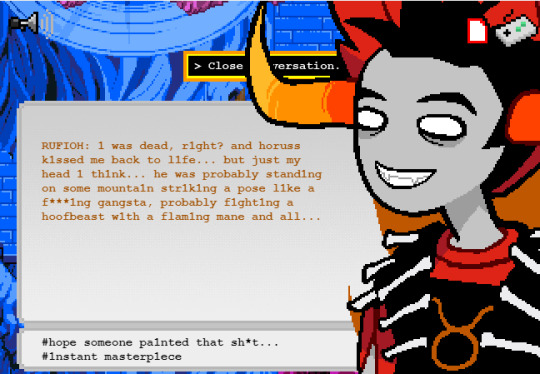
The imagery here is an obvious parallel between Jake and Dirk’s big damn kiss, and Rufioh and Horuss’s - but between Rufioh’s bravado and general obliviousness, and Horuss’s clear triangular parallel with Dirk and Equius, we should expect that the situation is switched here - Dirk = Horuss, Rufioh = Jake.
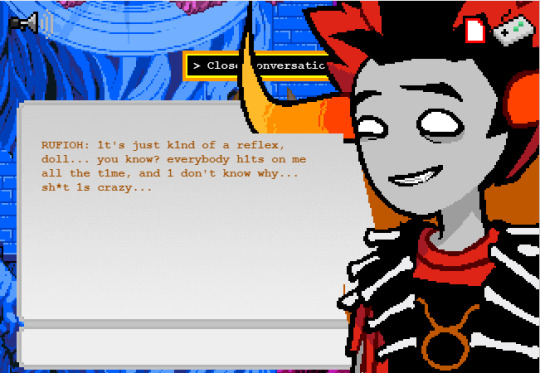
While it could easily just be a bit of extraneous characterization, I’m inclined to regard Rufioh’s characterization of the women in his life as “Dolls” especially because of his symbolic proximity to Lord English. (He is at best one degree of separation from him, as Jake English’s Alpha Troll Doppelganger) - and the fact that Puppets and Dolls are pretty much synonymous with each other in terms of the way that English interacts with them.
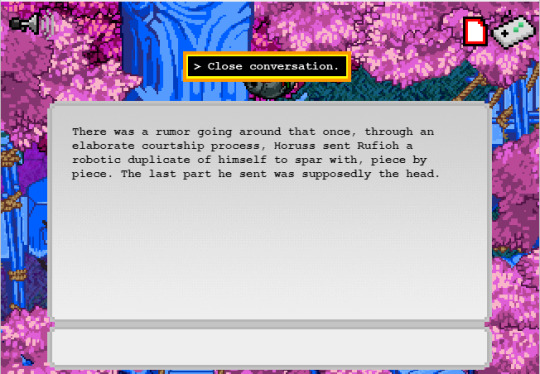
More extremely obvious parallels.
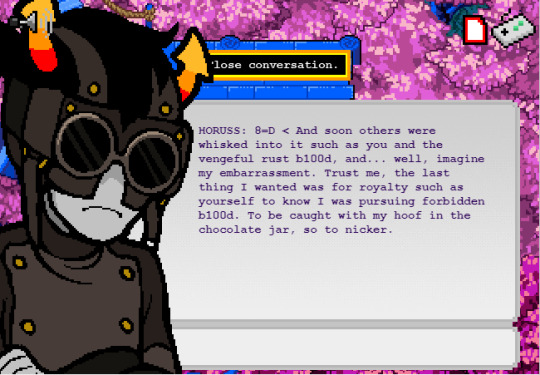
Both of the Zahhaks have hangups about dating down the Hemospectrum, and as long as we’re examining Dirk through the lens of the Zahhaks, allow me to speculate; I think that part of the reason Dirk chooses not to directly identify with the label of gay is less aloofly progressive futurism, and more that he is uncomfortable with his own sexuality.
As a guy who repeatedly appeals to reactionary ideals and rhetorical devices like “Western Civilization,” “Reason,” “Logic,” maybe there is a degree to which we can read Horuss and Equius’ self-repression through the haemospectrum into Dirk suffering from internalized Homophobia.
This is a real long shot, but I’ve always gotten the impression that Dirk is a bit of a bottom. Maybe his desire in building up Jake into a powerful counterpart, like English’s desire to transform Jake into a powerful rival, is built out of a desire to be Oedipally usurped by a former pupil - to have his Eromenos turn the tables, and become the Erastes in turn, in power-dynamic terms.
In Classical Civilization, homosexual relations weren’t unheard of, and were pretty reasonably common, but it was seen as shameful to bottom, especially for someone of a lower social standing than you were (Julius Caesar was mocked as the Queen of Bithynia when it was rumored that he bottomed for Nicomedes IV, which was a serious attack on his political career).
Wild speculative tangent over.
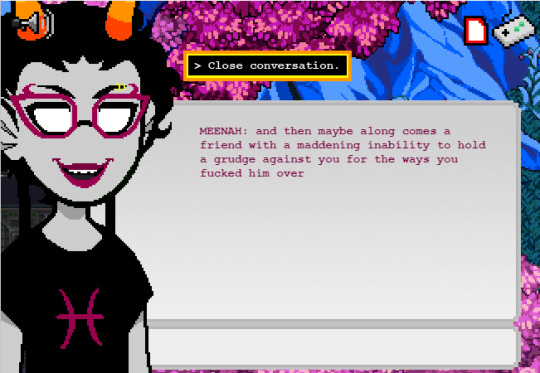
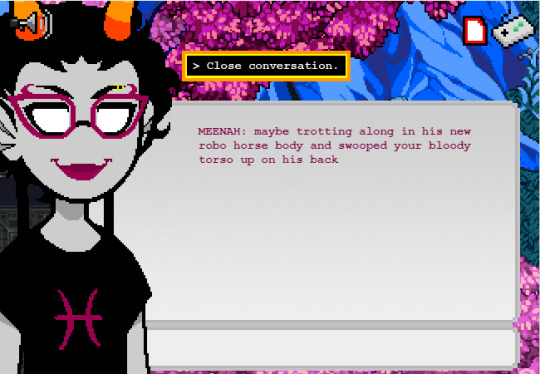
Now this is interesting; Meenah is unwittingly drawing a parralel between Damara and Vriska. The main commonality between them is that, like Vriska (and also like Rose, and also like Jane - who is the fourth and final character in this particular set) her spite and resentment is used as the vector for English’s manipulation of their setting.
Like Vriska, Damara deliberately sabotages the ability of her session members to win, helping to create a powerful foe who forces a session to be scratched.
Like Rose, Damara descends into nihilistic substance abuse to cope with feelings of emptiness.
Like Jane, Damara’s actual feelings of emptiness come about as a result of feelings of rejection in relation to betrayal from within her close friendship circle.
Ironically, while Damara’s reaction is far worse than Jane’s, her anger is actually probably far more understandable - Jane is not entitled to Jake.
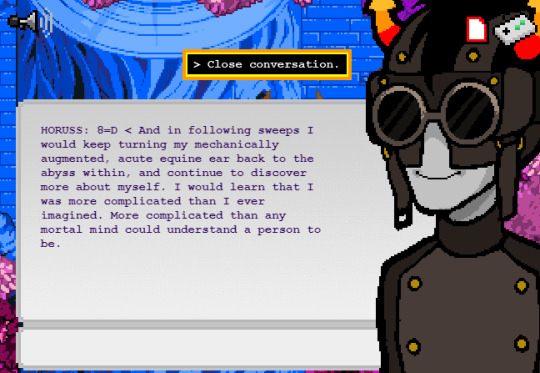
The situation between Horuss and Rufioh is also similar to what will resolve between Jake and Dirk shortly - they are just basically incompatible, or at least they will be until both parties do some work on themselves, but a combination of an oblivious party who can’t stop talking about himself, and social timidity on the part of the other prevents the situation from resolving amicably.
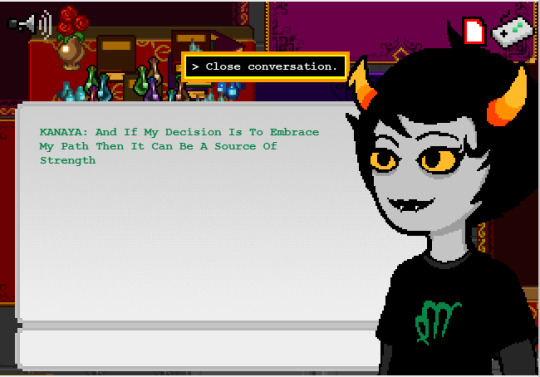
“As Long As I Know That I Am Free”
Sometimes, encountering our ancestors doesn’t have to be a source of tension, anxiety, expectation, and fear. Porrim models parental love for Kanaya in a way that, unusually for ancestors in Homestuck, is purely beneficial for her younger counterpart.
It’s okay to identify with roles and identities that have been corrupted or hegemonized by our culture. There’s nothing intrinsically bad about being a man, or about being a woman, as long as our embodiment of those roles is emancipatory to us.
Kanaya can still be a Mom, if that’s what she wants to be. Violence and money aren’t the only form that power can take.
Sometimes, learning the right lessons is just a matter of pausing for a second and being critical of all narratives; deciding for ourselves what we want to be. It’s the lesson that Porrim has to teach Kanaya.
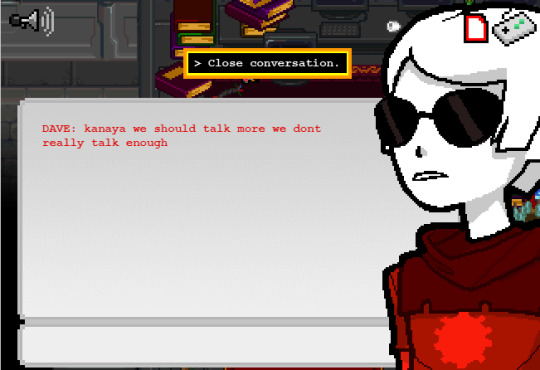
This is just objectively true.
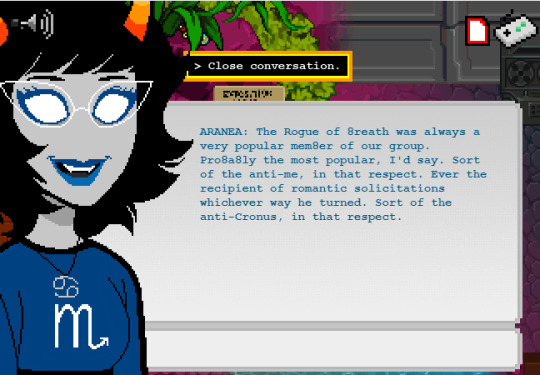
Aranea positions Rufioh as both a foil to Cronus, and to herself, further strengthening the Jake as Rufioh parallels.
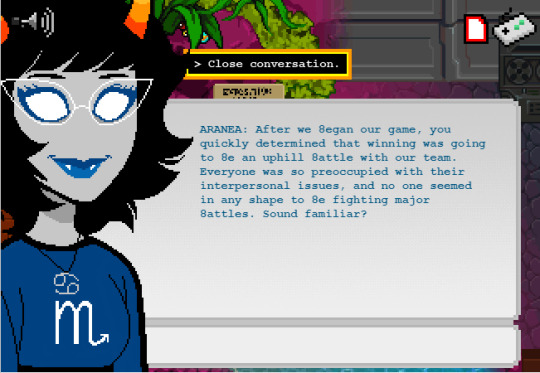
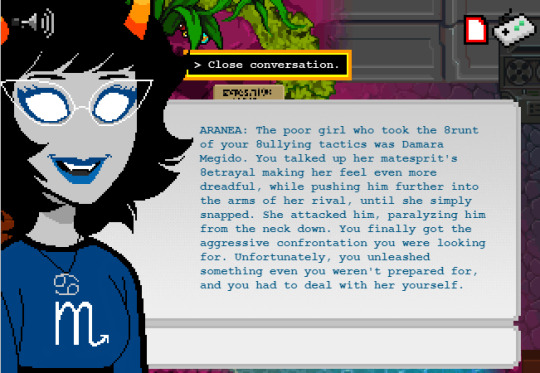
What I think is really interesting about all this, is if we want to read the other three trolls as Jake, Dirk, and Jane, that makes Meenah the Roxy of this group! And while Roxy has never been vicious or deliberately cruel, there’s a certain resonance between her persistent hassling of Jane, her meddling in the Jake English Sweepstakes, and the disaster that it provokes, and Meenah’s bullying - I even early on in my first readthrough took a disliking to Roxy because of what I viewed as exactly that - bullying her counterparts, assertively trying to get them to behave the way she wanted.
https://homestuck.com/story/5401
Oh man, where to even begin with Karkat riding off into the Penis Sunset. Like, the Sun in relation to Dave is persistently an icon of Bro’s surveillance of him, and then there’s his burgeoning affection for Karkat (he mentions story time with Karkat in the third Openbound suggesting that he actually took Karkat up on his offer to read through trashy Troll Romance).
Like, there’s probably something in Dave’s troubled psyche that’s on display here but damn if I know what it is. Maybe he’s ruminating on the fact that Bro would probably not be too accepting of his relationship with Karkat, hence the juxtaposition of the symbol of Bro’s hostility with the imagery of Karkat riding a dick?
https://homestuck.com/story/5404
I don’t really need to explicate much on what Rose is trying to say, I think but just in case, here’s a little rundown of what she’s trying to explain.
The apple is a symbol of an irreducible idea. Many ideas are reducible - as molecules are reducible to atoms, and atoms are reducible to quarks and stuff, so are ideas reducible to increasingly more abstracted and basic units.
The closer to notionally irreducible a thing becomes, the more difficult it becomes to express an idea, until at last, that which is truly irreducible resolves, and reveals to us the true, intrinsic nature of reality. For every complex idea, we can refer to more fundamental ideas, until at last, we arrive at an idea, which when probed, responds back simply, “It just does that.”
This, I think, is that to which we ought to give the name of God; that force so fundamental that it truly does just do that.
In the world of Homestuck, Symbols, and with them, Rituals - stories! Are manifestations of the primeval and irreducible ideas. Everything else is a universe in orbit around the Divine - the Aspects themselves, perhaps, or something more fundamental than the Aspects even.
What makes reducing these stories to the irreducible principles that they allude to so difficult is that you’re effectively trying to explain the electromagnetic force by comparing it to rubber bands, when in fact, the electromagnetic force is what makes the rubber bands behave that way in the first place.
As a Ritual, Rose’s drinking is pretty similar to John’s Dad roleplaying - an attempt at unity with Her Mom. Another empty signifier.
https://homestuck.com/story/5405
Dave is already really embracing his new role as the actually most sincere and straightforward member of the party. Lovin’ it.
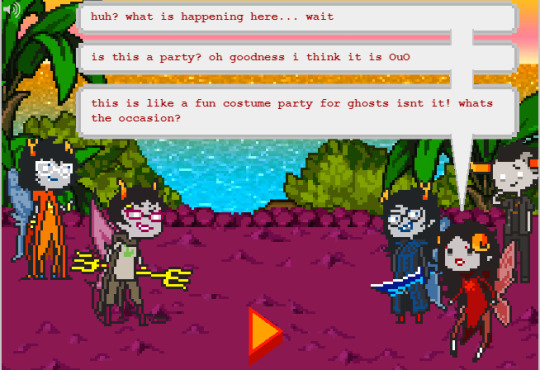
It’s kind of nice that Aradia and Vriska are getting along now. That’s gratifying for personal reasons.
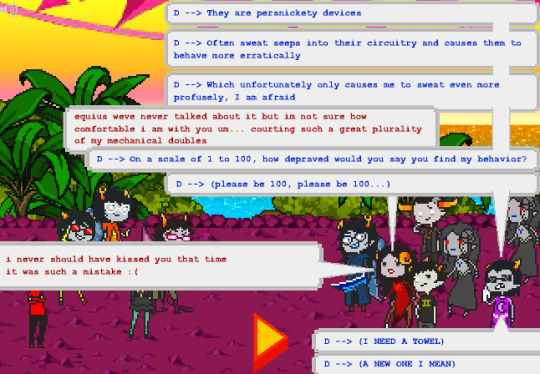
Ah yeah, I forgot that was ever addressed officially.
https://homestuck.com/story/5435
The man
HASS the ring.
https://homestuck.com/story/5440
And with the depressingly empty Void session established via a single flash, we shall conclude for the evening.
Tomorrow, we’ll get to know our little villain.
For now, it’s Cam signing off, Alive, and a little Annoyed that I wasted a couple hours playing the Outriders Demo this afternoon. Seriously, what an aesthetically bleak and kind of mediocre-looking class-based cover shooter.
9 notes
·
View notes
Text
EDA reviews Part 6 - books 47-55
Previous part 1, 2, 3, 4 & 5
47) The Slow Empire - Uh, couldn't really follow this one at all. There are books when the first person narration works, but not here - too many jumps in setting, too little connective tissue, most of it told from the POV of a person who is barely connected to the protagonists? And that's even before they started repeating chunks of text wholesale between various parts - and I couldn't figure out if it was intended, or if it is the ebook was acting out on me. More than half way through the book, I still couldn't entirely tell what the story is supposed to be about, or if the plot has even started yet. Even having finished it, I find myself somewhat aghast. There are a few glimpses of something interesting, but for the life of me, I can't figure out what. 4/10
48) Dark Progeny - Also not really feeling it. It's not a bad story, but I do rather prefer a Doctor Who story to actually feature the Doctor and the companions front and center, whether they are POV characters or not. Here, though, they are barely in it - it's even more egregious than the previous one in actually giving the supposed protagonists stuff to do, and even on rare occasions we do switch back to them, it is all pretty generic. Anji developing telepathic abilities and the Doctor trying to calm her down all the while Fitz is freaking out in the background? Yes, please, more of that. Following around 20 interchangeable OCs that have nothing to do with the trio? No thank you. 6/10.
49) The City of the Dead - If you are invoking magic in a sci-fi universe, you need to be able to handwave it. It doesn't need to be awfully complex, "something something aliens, something something energy" is usually enough, but without it, you can't just throw magic about willy nilly. There are rules.
There are moments when it is a beautiful story, evoking a lot of dream-like wonder, and if it managed to remain a hazy dream, it probably would have been better for it. At the same time there is something very uncomfortably cynical about it, to the degree it left a bad taste in my mouth. There is a narrow line between not shying away from the ugliness of the world and deliberately making something ugly just for the sake of it, and often it felt like it was leaning towards the latter. Dunno, I started out wanting to like it, and feeling rather conflicted about it, but by the end became utterly indifferent. 7/10
50) Grimm Reality - Pure crack. Mind Robber wishes it could be as hilarious and off the wall as this story is. It throws every cliche fairy tale narrative device in the book at the characters and expects them to take it with the straight face, all the while realizing that the rules of the world are completely bonkers. And it manages to sustain this energy throughout, which is a no small feat. It's actually pretty exhausting by the end of it. Fairy tales stories do not belong to a lengthy literary genre, and even taking time deconstructing them, at 95K words becomes it becomes just too much - figuratively, and, on occasion, literally. Still, pretty great, I wish more books had its energy 9/10.
51) The Adventuress of Henrietta Street - *sigh*. My expectations were pretty low to begin with, and I still am somehow disappointed. Credit where credit's due - it is probably most coherent of the books from Miles. And at least it's better than Interference. That's really not saying much, though.
Honestly, if you've read any story about prostitutes, murder, satanic sex rituals bordering on blatant pornography, eastern culture and "mysticism of female sex" used for fetish fuel, written by a dude who clearly gets off on all of this - you've read all of them. There is really nothing revolutionary or compelling about it. On the list of "plots I never want to see in Doctor Who", they are definitely up there. And the Doctor is dying again, because it wouldn't be Miles's book without it. And he's, uh... living in a brothel, trying to marry someone, in order to, uh..... ritualistically tie himself to Earth, for, reasons? Did I read that right? After over 100 years of living on Earth and wanting to do nothing else than seeing the back of it, right. And writing books not quite about sex but definitely about sex. Because that's the thing the Doctor apparently does now. Self insert what self insert. And Fitz and Anji are just... there. On an occasion. All of it exposed on in a dull faux academic style without a shred of characterization, all the while absolutely nothing of note is happening, despite being a singularly longest EDA.
Just, if you hate the characters so much. If you don't understand what makes them tick to this degree. If you don't even care to learn. If you consider any established emotions they should have about the plot you are putting them through beneath you. Why are you writing in a shared universe to begin with? 2/10
(I did have an unintentional moment of hilarity with it, though. There is a character that is referred to as Lord ______, as if his name is censored. TTS would always pronounce it as Lord Underbarunderbarunderbar. Always gave me a chuckle).
52) Mad Dogs and Englishmen - A hilarious story, a very easy read, flowing from scene to scene. There are several occasions of fridge horror treated with levity that I would have rather have avoided. Plus, it is as incestuous as a book about books can get, and yet.... It is just absurd enough to work.
Plus, the whole, “His books are full of black magic, mind control...and perversion - moral and ethical and sexual. He is polluting the atmosphere of our group”, “What’s next? Rewrite War and Peace so it’s about guinea pigs?” - Oh, the shade. It is a good book in its own right, but just for this alone, 10/10
53) Hope - It's a pretty average book. Not outstanding, not horrible. Would have made a decent episode, all things considered, in a bread and butter sort of way. It does have some great ideas - the refuge of humanity, the conflict between Anji and the Doctor finally coming to light - not quite the type of conflict I was hoping for, though. If only it had a bit more nuisance, without neatly delineated black and white, if the antagonist didn't end up being a mustache twirling villain, if the Doctor didn't end up strong-arming everyone in a much more macho manner than he normally goes for (with a rather clunky dialogue). It had potential, even if it didn't end up being realized in full. 8/10
54) Anachrophobia - Very meh. The set up was fairly contrived, it never made me care about any of the characters, including whatever the hell the Doctor and co were doing, not to mention any of the secondary characters. Not terribly engaging, after a point I was mostly flipping through it. There is some big conflict brought up at 95% mark, and it is resolved in just couple of pages via a deus ex machina and a paradox. Overall, I might have said that I would have liked it better if I was in a mood for existential horror, but I took a break in the middle to listen to the Lease of Life - and it actually touches upon several similar themes, but with and outstanding character drama and much more graceful execution, which made this book look even more poor in comparison. 5/10
55) Trading Futures - I will give the author all the points for keeping an eye on the future. Perhaps, in 2002, predicting tablets being used as menus in fancy restaurants wasn’t that big of a reach, but I absolutely had a spit take when TTS has read to me something about “eye-phones”. There are some modestly clever moments throughout the book. Too bad that the rest of it is a complete rubbish. Not terribly original, either - a lot of ideas are copied directly from other books and other franchises. Reasonably entertaining, all things considered, but in a much more slapstick sort of way than was probably intended. 7/10
Overall impressions so far - This batch is, for the most part, fine. Some stories are worst than others, some better. With one exception, nothing horrendous, but nothing to write home about, either. They are, for the most part, serviceable. Individually, they have decent enough plots. But. There is very little character work. They can generally be read in any order, or dropped entirely, and you wouldn’t miss anything. The Doctor is mostly coasting from the excellent streak in the last batch, always in a spot light. I am starting to tire of the whole amnesia arc, though - it was good, but it ran its course, and at this point, with everything functionally back to norm, with barely a stray mention of it here and there, we are starting to be overdue for some semblance of resolution of all that. Henrietta Street is entirely a step in the wrong direction - not only it does nothing worthwhile for the characters, it’s just getting unnecessarily further into the weedworks, adding yet another plot thread that is forced on other writers to carry (they mention it occasionally, but it’s not like there is much to build upon) - rather viciously reminding of the previous mess of an ark “don’t you dare to think that it is over”. And I am so over it. Just, move on.
The companions fare rather worse. They are decent enough, they participate in action, in each book, they are mostly staying in character, with a handful of neat moments here and there (in a blink and you’ll miss it sort of way, though), they aren’t written off as an unnecessary burden to carry, which is an improvement. There is nothing meaty given to them though - they ask the necessary questions, do the things required of them, and generally stay out of the way when they are not needed. I guess Anji has at least some character driven moments, even though most of them are reduced to “I miss my dead boyfriend”. Which is... fine, we’ve all lost people, we all mourn them in our own way, but it has been 14 books since her introduction, and she is leaving in another 10. To have her character reduced to just that bit from her first book, with barely anything else to offer.... Plus, all the while, she rarely felt like she integrated into the team - because she is constantly eying her exit and returning to normality (even though she always decides to stay just a little while longer due to circumstances), it’s like from the very beginning she had one foot out of the door.
But while Anji is a bit of a one trick pony, at least she has that much. Poor Fitz gets absolutely nothing to do. The last meaningful book that addressed his character in any way was all the way back around book #42-43, and even that was just catching up on plot after his prolonged absence. He’s been essentially frozen since early 30s books. He is generally a fun character to have around, and does good supporting work, but can he please get something more impactful any time soon? Heck, by this point I’ll even take the recurrence of “finding a new love interest number 20 who will inevitably die by the end of the book” - it has been overdone, and it is certainly not a very exciting plot, not to mention reductive, but at least it’d be something. Though, I guess only one companion is allowed to carry that staple at the time, and right now Anji is it, two dead lovers is just an overkill.
And it is an absolute shame - especially when considering that on the other side, Big Finish was in the middle of streak of some of the best stories. Over the same time that these novels were published, we had audios such as Project Twilight, Eye of the Scorpion, Colditz, One Doctor, Chimes of Midnight, Seasons of Fear, which were full of character.
3 notes
·
View notes
Text
Random Reads 2/18/21
Are You in the House Alone? by Richard Peck Are You in the House Alone? came out in 1976 and though I totally could’ve read it when I was a teen—and thus still a member of its target audience—I never did.
Gail Osburne is a sixteen-year-old high school junior and native New Yorker who’s not at home in the quaint Connecticut village her family relocated to several years back. I knew that the plot involved Gail receiving menacing anonymous notes and phone calls, and I was expecting these events to get started quickly and the suspense to remain high throughout. But that doesn’t happen.
Instead, the story is told retroactively, so we know Gail survives. Also, obvious culprit is obvious. (I hope the reveal wasn’t intended to be a surprise, but perhaps readers were less savvy about such things in 1976.) Initially, much more of the focus is on Gail’s relationships with her parents, boyfriend, and best friend, and in particular how the latter two are in the slow process of dissolution. Eventually she receives some threatening notes and creepy phone calls, gets scared, is let down by people in positions of authority, and comes face-to-face with said obvious culprit. That happens halfway through this slim novel. The rest of the book is about Gail’s recovery from her ordeal.
I thought Are You in the House Alone? was going to be fun, suspenseful fluff, but it turned out to be fairly serious and occasionally (intentionally) infuriating. I really appreciated how Peck was able to weave in a couple of threads that seemed very random at first and make them integral to the denouement, too. Ultimately, I didn’t love the book, but I kind of… respect it, if that makes sense. It didn’t go the cheap route.
The Automatic Detective by A. Lee Martinez Mack Megaton is a hulking robot who was created to destroy. He developed self-determination, however, and went against his programming. Now, he’s a probationary citizen of Empire City, where mutagens and pollution have created a very diverse population. While some “biologicals” are still “norms,” others have been physically transformed (like rat-like Detective Alfredo Sanchez) and others have been changed in not-so-visible ways (like Mack’s friend, Jung, a talking gorilla with refined literary taste). Mack works as a cab driver and is trying to keep a low profile, but when his neighbors are abducted, he can’t help but try to rescue them. This gets him into all sorts of trouble, of course.
Despite its name, The Automatic Detective isn’t really much of a mystery. I suppose it’s more… sci-fi noir. Mack meets various thugs, beats some of them up, gets beat up himself, etc. Slowly, he makes progress on uncovering a huge conspiracy. At times, I felt like Martinez was a little too enamored of the gimmick he created, and places in the middle dragged a bit as a result, but the ending is pretty satisfying and overall the book was enjoyable enough, even though it’s quite far from the sort of thing I usually read.
As a final note: I really liked that Martinez limited himself when it came time to invent universe-specific profanity. Instead of the text being liberally sprinkled with words like “frell” or “frak,” the phrase “Oh, flurb” appears but once (during a moment where the meaning is 100% apparent) and made me laugh out loud.
I don’t know if I’m necessarily eager to read more by Martinez, but I’m glad I read this one.
The Inimitable Jeeves by P. G. Wodehouse When I read My Man Jeeves back in 2010, I was somewhat disappointed because so much of it was repetitive. While there are some common elements that recur within the eleven stories that comprise The Inimitable Jeeves, it is still so very much superior that I’d now say… forget about that first book. Start here. Go back and read My Man Jeeves for completist purposes, if that’s your inclination, but start here for the best introduction to these characters and Wodehouse’s uniquely charming and amusing writing.
First published in 1923, The Inimitable Jeeves contains a linked set of stories that typically involve affable Bertie Wooster being imposed upon by either his eternally lovesick friend Bingo Little (who is “always waylaying one and decanting his anguished soul”) or his mischief-making younger cousins, Claude and Eustace. One plot thread involves convincing Bingo’s uncle (who provides him with an allowance) to agree to Bingo marrying a waitress. Jeeves comes up with the idea to ply the uncle with romance novels featuring class differences to soften his heart, and it ends up that Bertie is compelled to go visit the old fellow and claim to be the author. In addition to containing the most elegant description of sweat I’ve ever seen—“The good old persp was bedewing my forehead by this time in a pretty lavish manner.”—this situation is referenced a few times in subsequent stories until Bingo succeeds in getting married to a different waitress who really is the author of those romance novels.
So, even though you’ve got episodic happenings, it’s rather a satisfactory conclusion. Bertie is endearing, Jeeves is competent, the writing is excellent, and it made me laugh. (I especially liked when a character was described as resembling “a sheep with a secret sorrow.”) I’m so glad that I didn’t give up on the series after the first book; now I feel as though I finally see what the fuss is all about. I’d also like to give credit to the fabulous narration by Jonathan Cecil. I’m not sure if it’s deliberate, but I hear echoes of Fry and Laurie in his performance, and I heartily approve. I will certainly seek out more unabridged versions read by him.
The Murders of Richard III by Elizabeth Peters This is the second in the Jacqueline Kirby series of mysteries. I haven’t read the first, and wouldn’t normally begin with the second, but the book promised an English country mansion plus “fanatic devotees of King Richard III” so my usual routine flew right out the window.
Even before university lecturer Thomas Carter likened himself unto Watson, I’d noticed the similarities between how this tale is told and the Sherlock Holmes stories. We are never permitted inside Jacqueline’s head. Instead, we see her how Thomas, hopeful of one day securing her romantic affections, views her. It’s fairly interesting, actually, because Thomas’ opinion of her fluctuates, sometimes peevishly. “You drive me crazy with your arrogance and your sarcasm and your know-it-all airs,” he says at one point. And though he soon after claims “I’m no male chauvinist; I don’t mind you showing off,” the fact is that earlier he was grumbling inwardly about her feigning “girlish ignorance” to reel in mansplainers and then walloping the “unwitting victim” with a cartload of knowledge. It’s true that Jacqueline isn’t especially likeable sometimes, but for remorselessly trouncing the sexist louts she encounters throughout the book, I must commend her!
The mystery itself is somewhat bland, unfortunately. The leader of a Ricardian society has received a letter purportedly written by Elizabeth of York, which would exonerate Richard of the deaths of her brothers, the “princes in the tower.” He calls a meeting of the society, with each attendee costumed as one of the historical personages involved, and summons the press, planning to unveil his find with much fanfare. But someone begins playing practical jokes on the Ricardians reminiscent of the fates of the people they are pretending to be. The book isn’t a long one, and soon the pranks start coming right on the heels of one another. Because of the swift pace—and some shallow characterization—the solution is rather anti-climactic.
Still, while I’m not sure I’ll seek out any more Jacqueline Kirby mysteries, this was overall a decent read.
A Perfect Match by Jill McGown The series of books featuring Detective Inspector Lloyd (whose first name is a secret for now) and Detective Sergeant Judy Hill begins with a short yet enjoyable mystery in which a wealthy young widow is found dead in a small English town on property she’d just inherited from her recently deceased husband. Unlike some mysteries of which I am fond, there’s no preamble where readers get to know the victim or the circumstances of their life. Instead, immediately there’s a policeman discovering the body and then Lloyd turns up to question the victim’s next of kin. This same lack of character development hampers the romantic tension between Lloyd and Hill, leaving me with no idea what motivated Hill to finally decide to act on her feelings for him, betraying her marriage vows in the process.
The mystery itself is interesting enough, however, involving long-married Helen and Donald Mitchell who have ties to both the victim, Julia—her late husband was Donald’s older brother and Helen thinks they were having an affair—and chief suspect, Chris, originally a friend of Donald’s who has fallen in love with Helen. I can’t claim to have mustered anything more than a mild curiosity as to what the outcome would be, but neither did I guess the specifics, so that was good. I liked the interrogation scenes, too.
McGown’s writing had some fun moments. I loved the super-evocative imagery of Lloyd telling Hill that her new perm makes her look like Kevin Keegan. I also really appreciated a recurring bit where each chapter ends with the point of view of wildlife. When Chris is eventually brought in by the police, his arrest is depicted from a bird’s perspective, for example. There are also ducks, a moth, a fly, a cat… I don’t know if this device recurs in later books in the series, but I look forward to finding out.
Reconstructing Amelia by Kimberly McCreight This is the second mystery/thriller I’ve read in which a single mom who is a lawyer with a cold and unfeeling mother of her own attempts to work out the mystery of what happened to a family member (the other being Girl in the Dark by Marion Pauw). Is that some kind of trend these days?
Kate Baron has a demanding job at a swanky firm, but she’s trying her best to be a good mom to her fifteen-year-old bookworm daughter, Amelia. She’s shocked to get a call from Grace Hall, the prestigious private school Amelia attends, saying that her daughter has been accused of cheating, and by the time she makes her way to the school, Amelia has evidently jumped to her death from the school roof. The police are only too happy to classify her death as a suicide, but when Kate gets a text that says “Amelia didn’t jump,” she starts trying to put together the pieces of what happened.
Reconstructing Amelia has quite a few problems. Despite her better judgment (and a promise to her best friend), Amelia joins a clique of bitchy girls at school who end up publicly humiliating her and trying to get her expelled when she falls in love with someone deemed off-limits. It’s hard to muster sympathy for what she ends up going through when one remembers the cruel prank she was willing to pull on someone else as part of the initiation process (largely kept off-camera to keep us from disliking her too much, I guess). We’re repeatedly told about the great relationship Amelia and her mom share, but never shown it. The subplot about Amelia’s dad is the literary equivalent of wilted lettuce. And the fact that the new detective who gets assigned to the case allows Kate to question suspects is absolutely ludicrous.
And yet, I couldn’t hate the book, largely because of Amelia’s friend, Sylvia. For much of the book she comes across as shallow and self-absorbed, but when Amelia really needs her, she’s there. She gives Amelia this tour of “great moments at Grace Hall” to cheer up her impressive pal, right before breaking down about her own legitimate pain. I never would’ve thought at the outset that I would have such immense sympathy for Sylvia, but I do. I find myself hoping that she’ll be okay.
Shutter Island by Dennis Lehane It sure is nice going into a book unspoiled, particularly one as twisty as Shutter Island. I was quite happy with the book as it began, with U.S. Marshals Teddy Daniels and Chuck Aule taking the ferry to Shutter Island to track down a patient missing from Ashcliffe Hospital for the Criminally Insane. It’s late summer 1954, and these guys are manly but accessible, and surprisingly funny. Consider this relatiely early exchange that cracked me up:
Pretentious Doctor: *makes remarks on the lives of violence the marshals must lead* Chuck: Wasn’t raised to run, Doc. Pretentious Doctor: Ah, yes. Raised. And who did raise you? Teddy: Bears.
For a while, all seems straightforward. Then Teddy confides to Chuck that he’s actually come there looking for a patient named Andrew Laediss, who was responsible for setting the fire that killed Teddy’s wife two years before. Gradually, one starts to doubt everything (and there was a point where all of the uncertainty got to be a little much for me) but the ultimate conclusion is a very satisfactory one.
Why Did You Lie? by Yrsa Sigurdardottir Set in Iceland, Why Did You Lie? starts out with three different storylines taking place a few days apart. The first involves a photographer on a helicopter journey to take pictures of a lighthouse on a rock in the middle of the ocean, the second is about a policewoman whose journalist husband has recently attempted suicide, and the third is about a family who returns from a house swap with an American couple to find some of their stuff missing and weird footage on the security camera. Of course, as the book progresses, these storylines converge, and it’s pretty neat when the police activity the helicopter flew over in chapter one turns out to be almost the culmination of the policewoman’s plot thread.
For some reason, I can’t help wondering how Ruth Rendell might’ve written this book. I think Rendell would’ve done a lot more with characterization, for one thing. There’s certainly some here, especially for the anxious husband who struggles to make his wife admit something really has gone wrong with their houseguests, but the primary concern seems to be getting on with the suspenseful action. Quickly, each plot features some kind of creepy lurker and then ominous notes (variations on the “why did you lie?” theme) figure in to all three, as well. Nina, the policewoman, digs around and talks to people and works out that everything connects to a supposed suicide from thirty years ago.
The result is certainly an entertaining book, but not one I could really love. One major issue I had is being able to predict something very significant. The number of characters who could’ve been angry enough about the 30-year-old lies in question to terrorize people in the present is very small. And once the existence of a certain person is oh-so-casually mentioned two-thirds through the book, I thought, “Oh, well, it’s them, then.” And then a little later, I figured out which of the characters it must be and I was right. This made for an anticlimactic ending that was clearly meant to be a shocking one. Also, I would’ve liked to have cared more that one character ends the novel poised to move on with life but, in reality, still in jeopardy.
I still would read more by this author, though.
By: Michelle Smith
3 notes
·
View notes
Photo

The Cost of Discipleship: Readings for the 23rd Sunday in Ordinary Time
One of the most famous German opponents of Adolf Hitler and Nazism was the Lutheran pastor and theologian Dietrich Bonhoeffer, whom the Nazis executed by hanging in April 1945 for his involvement in a plot against Hitler himself. Bonhoeffer’s most famous work was a meditation on the Sermon on the Mount entitled (in English) The Cost of Discipleship. In it, Bonhoeffer parted ways with a Protestantism that understood “salvation by faith alone” as some kind of easy road to heaven. Bonhoeffer criticized “easy-believism” as “cheap grace”
Cheap grace is the preaching of forgiveness without requiring repentance, baptism without church discipline, communion without confession. Cheap grace is grace without discipleship, grace without the cross, grace without Jesus Christ.
Costly grace confronts us as a gracious call to follow Jesus, it comes as a word of forgiveness to the broken spirit and the contrite heart. It is costly because it compels a man to submit to the yoke of Christ and follow him; it is grace because Jesus says: "My yoke is easy and my burden is light.
Bonhoeffer was a Protestant, but there is much in his writings that a Catholic can affirm, including the passage above. I can’t help thinking of Bonhoeffer as I meditate on the Readings for this coming Sunday, which stress the high cost of discipleship to this mysterious man Jesus of Nazareth, who is nothing other than the Wisdom of God in the flesh.
1. Our First Reading is Wis 9:13-18b:
Who can know God’s counsel, or who can conceive what the LORD intends? For the deliberations of mortals are timid, and unsure are our plans. For the corruptible body burdens the soul and the earthen shelter weighs down the mind that has many concerns. And scarce do we guess the things on earth, and what is within our grasp we find with difficulty; but when things are in heaven, who can search them out? Or who ever knew your counsel, except you had given wisdom and sent your holy spirit from on high? And thus were the paths of those on earth made straight.
There is little controversy over the date and authorship of the Wisdom of Solomon. Strictly speaking, the book makes no claims about its own authorship, although the first-person “voice” of the book clearly cloaks itself in the persona of the biblical Solomon. The Church Fathers recognized this as a literary device. St. Augustine’s remark is representative: Next are the … three books of Solomon, viz., Proverbs, Song of Songs, and Ecclesiastes. For two books, one called Wisdom and the other Ecclesiasticus, are ascribed to Solomon from a certain resemblance of style, but the most likely opinion is that they were written by Jesus the son of Sirach. Still they are to be reckoned among the prophetical books, since they have attained recognition as being authoritative.
The Wisdom of Solomon is heavily influenced by Greek philosophy and rhetoric. It gives every evidence of having been composed originally in Greek, and a variety of factors, including the dominating concern with matters Egyptian in the second half of the book, suggest that the large Jewish community in Alexandria, Egypt, was the location of composition, at some time between 250 and 100 BC. Since the author seems to be responding to a campaign of persecution against observant Jews, scholars often propose either the reign of Ptolemy IV Philopator (221-204 B.C.), or Ptolemy VII Physicon (145-117 B.C.) as likely periods of composition.
A major contribution of the Book of Wisdom is to the theology of the Holy Spirit. The book characterizes divine wisdom as a person and virtually identifies her with the spirit of God, i.e. the Holy Spirit:
For wisdom is a kindly spirit (1:6)
In her there is a spirit that is intelligent, holy, unique … all-powerful, all-seeing (7:22)
She is a breath of the power of God, and pure emanation of the glory of the Almighty (7:25)
Who has learned your counsel, unless you have given Wisdom, and sent your Holy Spirit from on high? (9:17)
So there is progress in revelation in the Book of Wisdom. In this late Old Testament work, we see further articulated a reality hinted at previously, namely, that there are multiple persons in the Godhead, and God’s Spirit is a Person.
In Patristic exegesis, these passages about Wisdom are often taken as describing Christ, whom the New Testament identifies as “the wisdom of God” (1 Cor 1:24). Although the more natural application of these passages of Wisdom is directly to the Third Person, the Holy Spirit, their application to the Second Person is justified inasmuch as he is the Christ, the “Anointed One,” who is anointed with the Spirit and thus shares the Spirit’s attributes.
Focusing on this Sunday’s Reading, we note that the sacred author stresses how difficult the attainment of wisdom is, even in relation to material concerns, much less to supernatural and transcendent truth. Our physical needs and appetites confuse and cloud our thinking, because we are strongly motivated to reason to conclusions that allow us to satisfy our bodies, rather than to conclusions that are strictly true. In humility, the sage acknowledges that the attainment of truth about ultimate reality is really a superhuman effort. It is something beyond our strength, truly a miracle. Without the help of God, we would all but despair of coming to the truth about the reality of things. But God makes it possible by the gift of the Holy Spirit:
Or who ever knew your counsel, except you had given wisdom and sent your holy spirit from on high?
The sage here reflects a biblical theme that wisdom is the gift of God’s Spirit. This can be seen in the accounts of notable wise men in salvation history.
For example, Joseph, the visionary and royal steward over the land of Egypt, derived his wisdom from the Holy Spirit:
Gen. 41:38
And Pharaoh said to his servants, “Can we find such a man as this, in whom is the Spirit of God?” 39 So Pharaoh said to Joseph, “Since God has shown you all this, there is none so discreet and wise as you are …
Likewise Daniel:
Dan. 5:11
There is in your kingdom a man in whom is the spirit of the holy gods. In the days of your father light and understanding and wisdom, like the wisdom of the gods, were found in him …
And the Messiah who is to come will be marked by similar wisdom:
Is. 11:2
And the Spirit of the LORD shall rest upon him, the spirit of wisdom and understanding, the spirit of counsel and might, the spirit of knowledge and the fear of the LORD.
2. Our Responsorial Psalm is Ps 90:3-4, 5-6, 12-13, 14-17
R. (1) In every age, O Lord, you have been our refuge.
You turn man back to dust, saying, “Return, O children of men.” For a thousand years in your sight are as yesterday, now that it is past, or as a watch of the night. R. In every age, O Lord, you have been our refuge.
You make an end of them in their sleep; the next morning they are like the changing grass, Which at dawn springs up anew, but by evening wilts and fades. R. In every age, O Lord, you have been our refuge.
Teach us to number our days aright, that we may gain wisdom of heart. Return, O LORD! How long? Have pity on your servants! R. In every age, O Lord, you have been our refuge.
Fill us at daybreak with your kindness, that we may shout for joy and gladness all our days. And may the gracious care of the LORD our God be ours; prosper the work of our hands for us! Prosper the work of our hands! R. In every age, O Lord, you have been our refuge.
Psalm 90 is the only Psalm attributed to Moses, and the it has a decided melancholy tone, as a meditation on human frailty immediately after the disastrous ending of Psalm 89, in which all the hopes of Israel pinned upon the Davidic dynasty are dashed in tragedy and destruction. The Israelite reader of the psalms, having been brought to despair over the apparent failure of the covenant with David, now “goes back to Moses” for advice in Psalm 90. Moses observes the utter lack of power on the part of human beings, and recognizes that the only lasting things are those granted by God. He leads Israel in prayer: “Teach us to number our days aright, that we may gain wisdom of heart!” Much like the sacred author of the Book of Wisdom, Moses acknowledges that wisdom is beyond our reach, and is ultimately a gift from God.
3. Our Second Reading is Phmn 9-10, 12-17
I, Paul, an old man, and now also a prisoner for Christ Jesus, urge you on behalf of my child Onesimus, whose father I have become in my imprisonment; I am sending him, that is, my own heart, back to you. I should have liked to retain him for myself, so that he might serve me on your behalf in my imprisonment for the gospel, but I did not want to do anything without your consent, so that the good you do might not be forced but voluntary.
Perhaps this is why he was away from you for a while, that you might have him back forever, no longer as a slave but more than a slave, a brother, beloved especially to me, but even more so to you, as a man and in the Lord. So if you regard me as a partner, welcome him as you would me.
From now to the end of the liturgical year, the Lectionary reads semi-continuously through St. Paul’s letters to individuals (Philemon, Timothy, Titus), starting with St. Paul’s shortest letter, the one-chapter epistle to Philemon. This is the only reading of Philemon on a Sunday or Feast Day in the Church’s calendar.
The Letter to Philemon concerns a runaway slave, Onesimus, whom Paul met, converted, and discipled while he was in prison. When Onesimus was finally released, Paul sent him back to his master Philemon (already a Christian) with a letter asking Philemon to free Onesimus and allow him to return to assist Paul in his ministry. The letter is an important testimony to the Christian belief in the equal human dignity of all persons, despite societal structures (like slavery or abortion) that deny dignity to some.
Onesimus was Philemon’s legal “possession”, but Paul is asking Philemon to “renounce his possessions” for the sake of the Gospel, that is, for the sake of the success of Paul’s preaching ministry. Jesus will call all his disciples to “renounce their possessions” in the following Gospel Reading.
4. Our Gospel is Lk 14:25-33:
Great crowds were traveling with Jesus, and he turned and addressed them, “If anyone comes to me without hating his father and mother, wife and children, brothers and sisters, and even his own life, he cannot be my disciple.
When speaking of “hating” one’s family, Jesus is not speaking literally, but using a common rabbinic literary technique we now call “hyperbole,” that is, a dramatic overstatement that attracts attention and provokes thought. What does it mean to “hate” one’s family? It means one needs to be willing to break family ties if one’s family opposes the call of Christ on one’s life. One never stops loving one’s family, though, because love of God and love of neighbor are the summation of God’s law, and one’s family certainly counts as one’s “neighbors.” Furthermore, elsewhere Jesus criticizes the Pharisees for using a loophole in the law to justify not caring for their parents (Mk 7:11), and Paul rebukes Christians who do not care for their own family (1 Tim 5:8). So we know that under ordinary circumstances, love for family is mandated (as in the Fourth Commandment). Nonetheless, if the choice is between honoring family and following Jesus, one must choose Jesus. The Muslim convert Joseph Fadelle faced this choice and writes about it in the riveting book, The Price to Pay, available from Ignatius Press.
Whoever does not carry his own cross and come after me cannot be my disciple.
This is absolutely shocking language, whose original effect is lost on us who now where crosses around our necks as jewelry. The cross was an instrument of execution and torture, like an electric chair but much worse. The use of crosses was almost unique to the Roman Empire, which liked to employ them to make awful spectacle of the agonizing deaths of anyone who opposed Roman power. Jews hated the cross, because a curse was attached to anyone who died “on a tree” according to Deut 21:22-23.
The condemned man carried his own cross to the site of his execution, so “to carry one’s cross” meant that you were on death row, there was no chance of appeal, you would certainly die soon. Let’s keep in mind that Jesus says this during the Lukan “Travel Narrative”—that is, while he is on his “death march” to Jerusalem to experience his passion (Luke 9-19). Jesus knew he was going to his death, and anyone who followed him also risked death. As it would turn out, everyone abandoned Jesus at the end, so he went to the cross alone. But in years afterward, many of his disciples would share the cross with him.
Which of you wishing to construct a tower does not first sit down and calculate the cost to see if there is enough for its completion? Otherwise, after laying the foundation and finding himself unable to finish the work the onlookers should laugh at him and say, ‘This one began to build but did not have the resources to finish.’ Or what king marching into battle would not first sit down and decide whether with ten thousand troops he can successfully oppose another king advancing upon him with twenty thousand troops?
But if not, while he is still far away, he will send a delegation to ask for peace terms. In the same way, anyone of you who does not renounce all his possessions cannot be my disciple.”
Jesus’ method of preaching is so different from methods I was taught or have witnessed at megachurches or on TV. Much of contemporary evangelism relies on some variation of “come to Jesus and your troubles will be solved.” But Jesus seems here to be encouraging people to leave and go away, telling them that they don’t realize what they are getting into. Following Jesus will cost everything that you own. If there is any possession you won’t give up for the sake of Jesus, you have not attained discipleship.
Can the renunciation of your material goods really be the way to salvation and communion with God? This seems paradoxical, difficult to accept. This is the Wisdom that does not follow human logic, that defies natural reasoning. To see the wisdom and beauty of poverty and renunciation requires a gift of insight from God, a reception of his Spirit.
Several times in the Gospel of Luke, Jesus is shown to be the bearer of God’s Wisdom:
Luke 2:40 And the child (Jesus) grew and became strong, filled with wisdom; and the favor of God was upon him.
Luke 2:52 And Jesus increased in wisdom and in stature, and in favor with God and man.
Luke 7:34 The Son of man has come eating and drinking; and you say, ‘Behold, a glutton and a drunkard, a friend of tax collectors and sinners!’ 35 Yet wisdom is justified by all her children.”
Luke 11:31 The queen of the South will arise at the judgment with the men of this generation and condemn them; for she came from the ends of the earth to hear the wisdom of Solomon, and behold, something greater than Solomon is here.
Jesus now tells us that the path to salvation requires us to embrace death and renounce our family and material wealth in order to follow him. That is not the path to salvation we would have reasoned out for ourselves! But it is the Wisdom of God which transcends our categories, the Wisdom of God that we prayed to receive with “Solomon” the sage and Moses the psalmist.
Many even in the Church would have us believe that we can be saved without repenting of our sins, even that we can receive the Eucharist in good conscience without repenting of mortal sin. Don’t believe that lie. No one will enter heaven without acknowledging and renouncing every sin they have ever committed. This is necessarily the case, because attachment to sin is attachment to that which is not-God and not-love. And no one in heaven will be or can be still attached to not-God and not-love. Therefore, no one will still be attached to sin in heaven. If we do not repent of and renounce our sin in this life, there is purgatory for those sins that are not mortal, and hell for those who have truly rejected God and the kind of love he represents. It is a sobering thought, so let us make a good examination of conscience before coming to this Sunday’s Eucharist.
From: https://www.pamphletstoinspire.com/
7 notes
·
View notes
Text

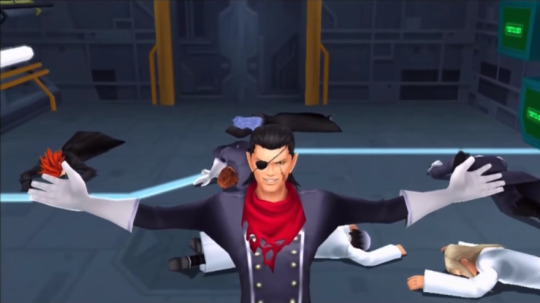
Xemnas: A heart is never lost for good. There may have been variances in our dispositions, but a number of us unquestionably showed signs of a burgeoning replacement. Once born, the heart can also be nurtured. Our experiments creating Heartless were attempts to control the mind, and convince it to renounce its sense of self. But understand, one can banish the heart from the body, but the body will try to replace it the first chance it gets, for as many times as it takes. And so I knew, even after we were divided into Heartless and Nobodies, it was just a temporary separation.
Sora: Why, then? Why did you lie to them and tell them they had no hearts?
Xigbar: Xemnas and Xehanort formed the Organization for a specific reason–round up a bunch of empty husks, hook them up to Kingdom Hearts, then fill them all with the exact same heart and mind. Translation–they were gonna turn all the members into Xehanort.
I suppose. But I’d still say it was more likely that they were being experimented on in the lab that day. That was the Heartless Manufactory. Xemnas said that the experiments creating Heartless were attempts to control the mind and get it to renounce its sense of self. And Xehanort formed the Organization in order to take the empty husks and fill them with Xehanort’s heart and mind.
“I can’t claim to know the outcome of this venture, either. We are dealing with hearts, after all—unpredictable at best.” Ansem aimed the end of the device at Kingdom Hearts. The one great heart—Kingdom Hearts. But what was a heart? For all that, I never did find the answer, Ansem thought.
When a person’s heart was taken from them, a Heartless was created, a thing with no sense of self, while the body and soul left behind would become the makings of a Nobody. But what if someone deliberately released their heart from their body through the strength of will alone? Sora and Xehanort had managed to retain their selfhood even after becoming Heartless.
In other words, it sounds like Xehanort thought that Nobodies would make the perfect vessels.
Ansem’s Report 13
Where does the body go when it separates from the heart? If the soul remains within the body, is it still considered to be deceased? When the heart returns to the Heartless, the physical form disappears. But that is merely true in this world. Perhaps the body exists in another form in another world. If that is the case, then it is possible for one to exist in two worlds. A being that is neither darkness nor light; belonging nowhere; abandoned by its heart; a mere shell of its former self. The relation between the heart and body is complex. However, I am certain that if your self exists here, then by definition, the other cannot truly “exist.” The other, the one which does not exist, shall be dubbed, “Nobody.”
Xehanort apparently is the one who discovered Nobodies during these experiments. He probably assumed that they would have no sense of self, like the Heartless.
The group called the Organization is a group of nobodies who gathered together. Nobodies–beings who don’t exist. Beings who lost their hearts to darkness, Heartless. And then, when strong-hearted beings become Heartless, the body and soul exist separately from the heart, and receive life in this land. That’s a Nobody. And then, Nobodies born from the owners of especially strong-hearted beings fall into birth still retaining their human shape. That means, the Nobodies gathered as Organisation members once held strong hearts. Really? Axel wondered to himself. Did that self in my memories really have a strong heart? Don’t really know. And then, Nobodies without hearts wish for only one thing. A heart. If I was asked if I wanted a heart, I guess I’d answer that I did. But, do I really want a heart? Can a heart really fill this hollowness I’ve carried since I fell into existence as a Nobody?
Most Nobodies that are born are like Dusks. Only a very strong-hearted person creates a Nobody that retains the same shape as its former self. That seemed to be the ultimate goal of the experiments, at least at the end. Xehanort wanted to find strong-hearted people, create humanoid Nobodies by turning them into Heartless and then he’d have perfect vessels. And he apparently tricked the apprentices (except Braig) into willingly becoming Nobodies. They’d be exactly the same, just without hearts. And of course, he’d use the test subjects from the experiments who didn’t become corrupted by darkness. They would obviously have strong hearts and if he forcibly extracted their hearts like he did with Braig, then they’d create special Nobodies.

“I am Lexaeus. You’ve done well thus far. But to possess your powers and yet fear darkness… What a waste.”
Riku scowled. “I do not…fear it!” he said as if to convince himself. “I’m—”
“I sense that you do,” Lexaeus interrupted, quite unperturbed. “You’re also capable of controlling the darkness. Cast away your useless fear. Open your heart and embrace the darkness.”
“And if I don’t?” Riku retorted, steadily closing in on Lexaeus.
If he embraced the darkness, he would become stronger—but he didn’t need that kind of strength. He only wanted to use his own strength.
Lexaeus absolutely talks like becoming a Nobody was a choice he made. He looks down on Riku for being afraid of darkness.
Lexaeus gave him the briefest of smiles and raised his heavy ax-like sword. “Then, you lose both light and darkness—and disappear!” Enormously powerful darkness radiated from him, fierce enough to make Riku think of Ansem. Riku grunted as the pressure of it slammed against him.
“I, Lexaeus, will not yield to the frail heart of an infantile coward! Now, stop resisting—and let the darkness in!”
“Never!” Riku brandished Soul Eater and rushed at Lexaeus. “I am not afraid of the darkness!”
“Ha! Nonsense! You can become stronger… But if you do not accept the darkness…you will be destroyed!” Lexaeus’s sword knocked Riku back and came down on the floor with enough force to cleave it, scattering chips of marble, which Lexaeus crumbled in his fist.
These bits from the CoM novels are sadly the most characterization Lexaeus gets.
“Rgh… To think…you had so much power…” Now Lexaeus dropped heavily to his knees.
Riku jumped back to put some distance between them, also out of breath. “What’s the matter, Lexaeus…?” he said between gasps.
Even without using the darkness…I can still defeat you.
“Darkness isn’t…all it’s cracked up to be, huh?” Riku told him. “This fight…is mine.”
But you can tell that he is really obsessed with strength.
Lexaeus gave him a cruel smile. “Hmph…so I must accept my defeat here. But do not make the mistake of underestimating the darkness in me! As I am destroyed, it will leave this ruined vessel and drown you!”
Then there was a terrible shock wave far greater than what Riku had felt from the darkness that Lexaeus radiated before the battle.
“Wh…what’s happening?!” A relentless swirl of darkness surrounded him, swallowing him up until he disappeared into it.
Lexaeus laughed madly. “This is my strength… I, number five in the organization… I who was once his favorite pupil!”
Those were Lexaeus’s final words before he vanished into the darkness.
We do get a particularly interesting bit of info. He was a favorite pupil. Given the way he talks about fearing the darkness, it sounds like he’s referring to Xehanort. Aeleus was lured in by the promise of greater power.

When Zexion thought back on their erstwhile research, the “plan” seemed to him like a contradiction in terms—trying to reclaim what they had lost through their own actions. He didn’t believe they had done anything wrong by studying and producing the Heartless. It just so happened that in that process, they had forfeited their own hearts.
Zexion said that they lost their hearts while studying and producing Heartless. Of course, he was a kid, so I don’t expect him to know everything that was going on with Xehanort. But he and Even lost their hearts around the same time. Ienzo doesn’t talk like Xehanort personally extracted his heart like he did with Braig. He speaks like it was the result of the experiment they were doing.
“I tell you, the project failed,” Marluxia repeated. “And I must report that failure to our leader.”
Their leader—a man who had once had another name with other memories… He was the actual fake. The one who had stolen the identity of Ansem.
“What— No, wait! Don’t tell him that!” Vexen sounded as if he might fall to his knees and beg.
Marluxia made a small cruel smirk and told him quietly, “Perhaps we can work something out.”
“How?” Vexen looked up.
And all I can really say about Even is that he doesn’t like going down into the basement where the experiments took place, because apparently he has bad memories of being there. And he is absolutely terrified of Xehanort. I don’t think he was ever a willing participant in what was going on. But he seems to have gone along with what the others were doing due to fear and probably a desire to protect Ienzo.
Day 119: Hearts and Emotion
Author: Xaldin
Watching that foolish beast flail about only deepens my disdain for humans and their incessant need to be pinned down by feelings. We became Nobodies precisely to avoid the shackles of emotion. It was only later that we realized the scale of that loss: that some things simply cannot be done without a heart. Nonetheless, I see nary a pleasant thing about it.
Xaldin flat-out states that he chose to become a Nobody to escape emotions. When they were recompleted, Even, Ienzo, Dilan, and Aeleus were inside of that transporter area. This is what let the MCP warp Sora into Space Paranoids. And Braig was already with Young Xehanort when he was recompleted.

“We’re Nobodies. We have no one to be—we just are. But now you don’t have to be at all. No more existence, no more memories.
You’re off the hook.”
Axel didn’t seem to be paying attention to Sora and the others. He only looked at Vexen.
“No one to be?” What could that even mean…?
But Lea and Isa were outside of that area, and they were the only two “apprentices” wearing the black robes. Lea looks like he was going towards the computer and Isa looks like he was going towards Lea. And Axel never talked at all like someone who ever planned to lose his heart like all the other apprentices. He clearly was not in on whatever plan they had. Axel treats the apprentices far differently than the other Organization members. He’ll happily play cards with Luxord, and he defends Demyx when Roxas makes fun of him for being useless. But he delights in taking out Vexen and Zexion. And those two seemed like they were the apprentices who were the least morally responsible for what happened.
“Nothing less from the great Ansem—that’s what I should say, isn’t it? Or maybe—”
“You don’t know what you’re talking about! I’m protecting those islands!” Riku rushed into range, but this time the Claymore, Saïx’s sword, was there to block Soul Eater.
“How do you expect to protect anything when you’ve cloaked yourself in darkness? You sold your soul for power. Was it worth it?”
“Shut up.” Soul Eater pushed back the Claymore with a terrific clang.
When Saïx faces Riku in KH2, he acts absolutely disgusted with him for giving himself over to darkness in order to gain power. He was furious when Naminé told him he had a heart. He wanted one more than anything.
The human form of Xigbar, one of Organization XIII’s members. He became a Nobody during a certain experiment.
The journal in KH3D said that Braig became a Nobody during a certain experiment. And in KH3D, all of the Nobodies who have been recompleted have separate journal entries. Lea, Braig, Even, Ienzo, Aeleus, and Dilan all have journal entries for their regular selves. But Isa didn’t get one. Just Saïx. It implies that he wasn’t even recompleted as Isa at all. And when Braig and Young Xehanort retrieve him, he’s still unconscious. Young Xehanort calls him “Saïx” before he’s even retrieved. There was just nothing to ever indicate that they were apprentices before KH3. And it still feels implausible at best.
15 notes
·
View notes
Text
Character Re-imagined: Sandy
Well kids, we’re still doing our time for artist hiatus crimes so let’s move on to the next chapter! Chapter 100: High Expectatio-
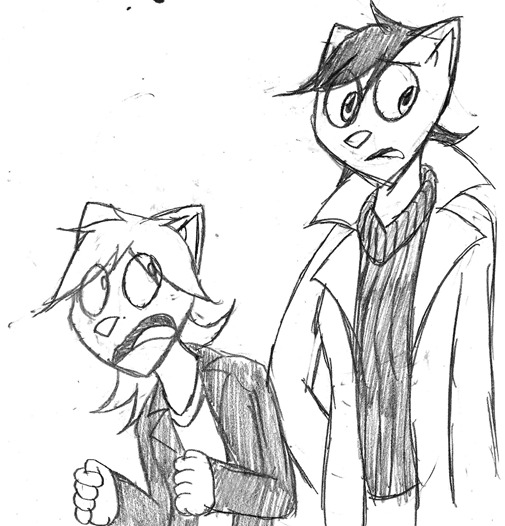
OH FUCK RIGHT, I’M SO SORRY I DID NOT FORGET ABOUT YOU SANDY! I SWEAR!
Okay, for those who haven’t dug too into this rant series. A while back, I did a half-rant on the chapter Model Girlfriend, which of course was the chapter where Sandy came back to Roseville for a day. I ended up not really finishing it because I found most of the talking points that I’d use, and the complaints I had with the chapter, weren’t necessarily with the chapter itself as much as it was with the characterization of Sandy. And my problem with the characterization was more to do with how I wrote Sandy in comparison to how the canon wrote her. And simply saying that my problem with a character was that she wasn’t how I wrote her just isn’t a fair critique by any measure. And no matter what people may think about the rants, the one thing I don’t want the rants to be perceived as, is unfair.
So I decided that I would do something similar to what I had done before, which was a Character Revisited which was for Paulo. Where I talked about Paulo’s characterization before Boy Toy and how much of a difference was done to his personality, and demeanor in the recent chapters specifically Table for One (Actually, is it still technically “recent” if these chapters are 3 years old? Man this shit is long). Anyway, I wanted to something similar for Sandy but be more of a Character Reimagined, talking about what I ended up having to do with the character and how I wrote them for January and False Idol. It was SUPPOSED to be after the Pit Stop but I kind of forgot about it, and uhh…
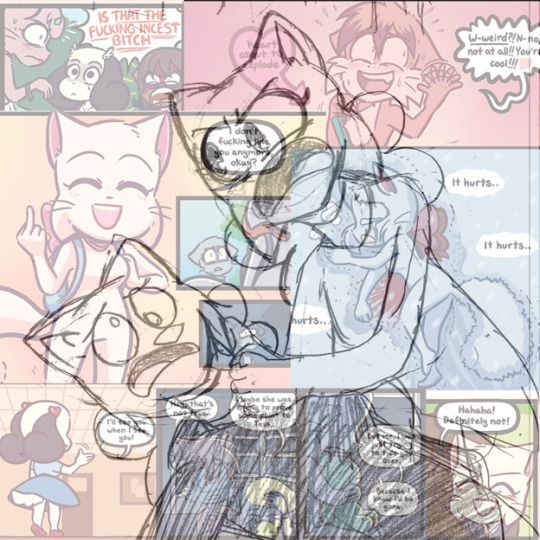
I got distracted. But nonetheless, we’re here now so let’s dive right into it. This is Sandy Re-imagined.
So if we’re going to talk about my Sandy, and her development as a character we of course have to start with January, and January’s take on Just Beautiful. And if you don’t know what January is, I’m not going to get too into it but it’s essentially my fancomic which is a faithful (as possible…) alternate take of the whole January arc, following the timeline from December to Happy Hour. And at its rough and rebellious beginnings, it was very run and gun in terms of writing. I didn’t care as much about building characters outside of setting scenes, and focusing on Lucy and Susan…until…
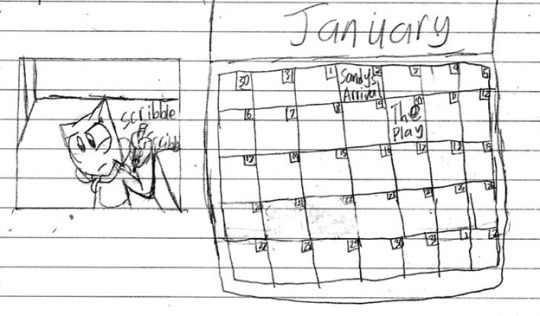
I had to do Just Beautiful. A chapter that I hated, featuring a character that I hated, that was centered around a ship I didn’t care about, and had little effect on what was happening in the story aside from just making Mike remorseful, because of…
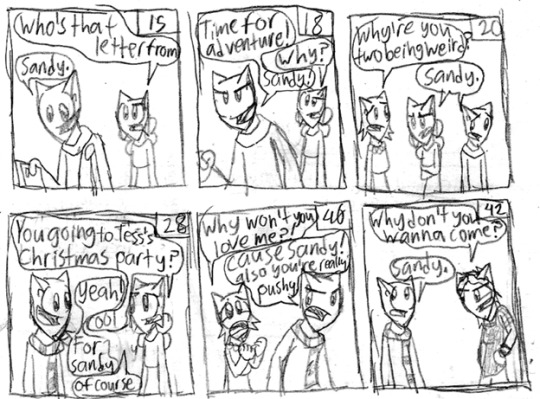
Yeeeah back then, I figured out that Sandy is more of a plot device, than an actual character (an opinion that still holds water today, and I swear to god I will get to that chapter). So I really did not care about her, or give her character any thought until I had to do this segment for January. Because, I cornered myself to do the chapter and realized something… “Hey, fuckface! You’re a writer! You don’t think this is interesting or fun? Then just make it interesting and fun for you!” Sandy is such a blank slate of a character that I could kind of do anything I wanted for her outside of what’s established, and since there wasn’t much established it meant I had to…
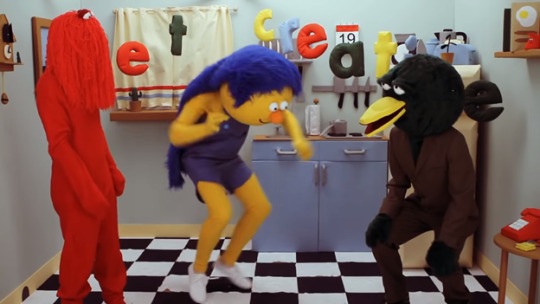
Get creative! The first part of writing Sandy was tackling the issues I had with her character in comic, specifically how little we know of her personality, how she interacts not only with Mike, but with people outside of her relationship. How does she take to adversity, how does she tackles problems, what problems does she face, how do they conflict with her relationship, and how does her relationship clash with that? And in January I couldn’t really dive too deep into that, especially because the story isn’t about her; it’s about Lucy. But I wanted to at least give something, or hint at that with her little scene just to show that there is at least something there. But more importantly, I wanted to establish one very key feature about Sandy. Something that I felt the comic left out, and it seems will never come true.
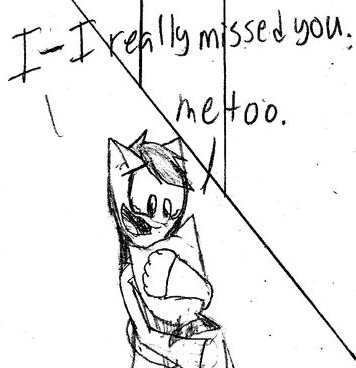
Sandy feels the distance too. If you look at the scene in January, this is the one bit of dialogue (except on bit at the end) between Mike and Sandy that isn’t directly from the canon to stick to the canon. And It is the main part of Sandy that I keep at her core because it is one of the one things we knew about Sandy which is that she loves Mike (aaaaand then Model Girlfriend came along and threw a wrench into that…) but at least for me this is what makes up Sandy. And since we’re talking about Sandy as a character I am going to spoil False Idol quite a bit, because False Idol is essentially a story about finding out about Sandy. Who she is, what her life is like, and how Mike plays into that. But one of the main things about Sandy, that I changed about her is brought up in this one bit in January.
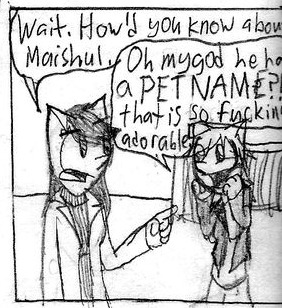
Sandy doesn’t tell anyone about Mike. The more I thought about how little we know about Sandy as a person, the more I thought about how little Mike knows about Sandy as a person. Which helped to expand her character more as a person. Looking at Model Girlfriend the whole idea of “Mike really doesn’t know Sandy as a person” was realized…but taken to a more bitter end. Whereas I still held onto the idea of Sandy really loving Mike, but she doesn’t share that with anyone. She keeps her romantic life separated from her co-workers and classmates, which is also touched on in False Idol.
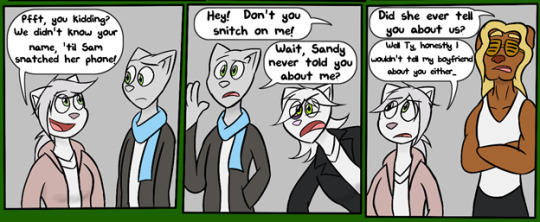
And more importantly, it goes both ways. In this way, there’s a lot more intrigue and options in Sandy’s character. Why is she keeping Mike a secret? Why did Sam have to steal Sandy’s phone to find this out? Is she ashamed of people knowing Mike’s her boyfriend or is there something more? And Why haven’t we heard anything about these guys? And the answer is something I won’t tell you, because that’d be too much of a spoiler, but what I will say is, that at her core the main statement I want to define Sandy is this: Sandy loves Mike. She loves him as much as Mike loves her. BUT when creating a character, and understanding a character there is one big factor to consider which I found the most fun in writing Sandy and what elevated her into a character that I found myself very engrossed in as a writer. To the point where even after 3 years I am still dedicated to writing her story in False Idol! And the one thing to always remember is that no matter what as strong, complex, or emotional your character is. They are only as interesting as the environment you put them in. That’s why if you look at the Just Beautiful scene in January, the first time we see Sandy say anything, before she sees Mike; the first interaction we see to give us an idea of how she is outside of Mike is her talking to her best friend.
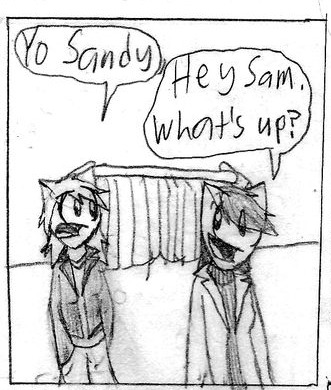
Sam! Who has grown on me like an aggressive tumor, and will probably be the death of me. The big part about writing Sandy and trying to make this character more interesting was building the environment around her. Brainstorming ideas, and thinking about what her life is like outside of Mike. There is a joke song I wish to make someday parodying Avenue Q and BCB, called There is Life Outside of Your Plot Line, and that’s basically what I wanted to explore with Sandy. Specifically her and the models. It’d be easy to assume that the modeling business is cutthroat, and her coworkers are bitchy people, and it’s so taxing, and she hates it, and all that jazz. But I wanted to take it in a different direction where her work environment isn’t actually that bad. Her co-workers are nice and down to earth people, with their own personalities and viewpoints. The first model to get expanded on like this of course being Sam, and her dynamic with Sandy. This is where of course False Idol comes in and brings out that world more. To give us a better understanding of the kind of people that Sandy hangs around with. But in order to flesh that out I’d need more than Sam which is why in False Idol!
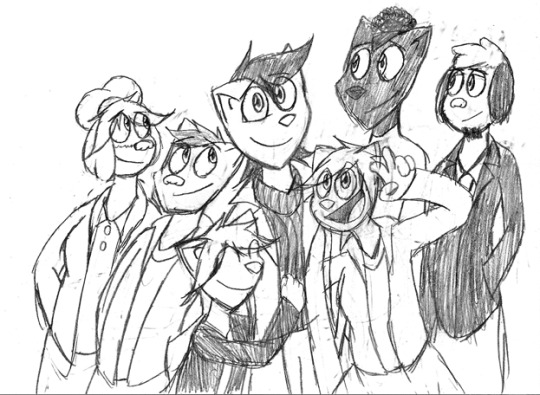
We get a slew of new characters! In order: Charlie Hartman, Daniel “Dan” Mercado, Samantha “Sam” Cartwright, Ashley “Ash” Clements, Alice McCarthy, and Jason “Jay” Cartwright. Oh and sadly I couldn’t fit him in here, but I would be doing my man a disservice by not mentioning him,
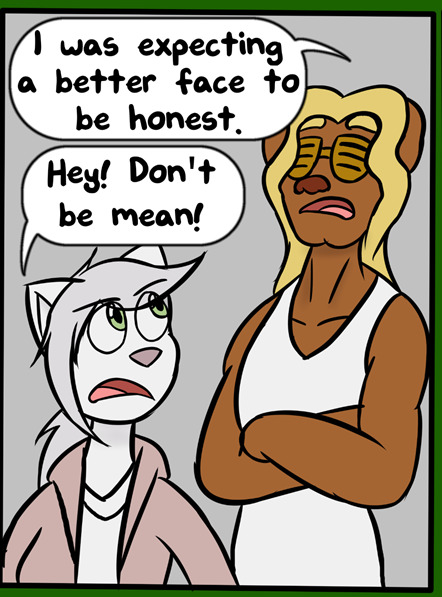
Tyrone the lovable meathead beefcake! The only one who I didn’t make a last name for. Because he doesn’t need it. He’s just Tyrone. Although I can only take half-credit for him, because he’s more of a shared joke between me and a friend that we both had a lot of fun working on. All of these characters help to build the setting and world that Sandy lives in, with their own different personalities. Sam being a spunky, rebellious, and surprisingly mature scamp; Alice being a very prideful, conceited, yet down to earth, and caring person; Ash being a grounded soft, cute, but hardened and smart girl. All of the characters help to give us an idea of not only Sandy, but an idea of what she deals with and the people she associates with. And one important thing about these characters, is the fact that I deliberately wrote it to where not one of these characters were assholes. I didn’t want to fall into the trapping of having Sandy’s life outside of Mike be some like horrible mean world and Mike’s her only escape, or make it where “Oh little did we know that Sandy’s suffering from this one HORRIBLE MESSED UP THING! SO NOW YOU HAVE TO FEEL BAD FOR HER AND SYMPATHIZE WITH HER OR ELSE YOU’RE AN ASSHOLE!” No, I wanted Sandy to have a fairly average life. So if you were thinking False Idol was gonna do some fucked up heel-turn like “OH BOY, LITTLE DID YOU KNOW THAT SANDY IS ACTUALLY A DRUG ADDICT AND WHORED HERSELF OUT TO GET THE JOB!” I’m sorry that’s not happening…Actually, fuck you I’m not sorry because that’s fucked up I’m not going there. AND I SWEAR TO GOD IF TAESHI DOES SOMETHING LIKE THAT WHERE IT TURNS OUT OH NO, SANDY HAD SOME FUCKED UP SHIT GOING ON WE DIDN’T KNOW ABOUT AND NOW WE ARE FORCED TO FEEL SAD! I am going to be fucking fuming mad.
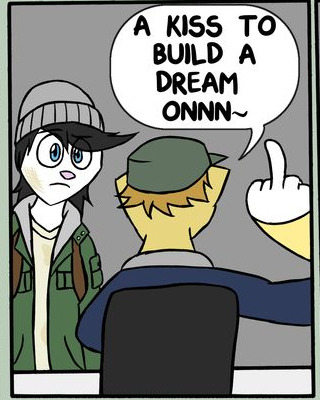
The main thing I wanted to do when writing Sandy, given how little we know about her and the setting she is in. Is to show this setting she’s in and give us an idea of what her life was like. I wrote Sandy and False Idol, in a way where you can look at her and the characters that surround her and feel like there was another comic going on at the same time. And we’re just coming in after they’ve gone through their own different mini story arcs and this is some big moment in their story too. I mean imagine if Mike suddenly went missing, running away from home and then Sandy comes to Roseville to get answers. And then she learns more about everyone, and all the stuff Mike’s been through…
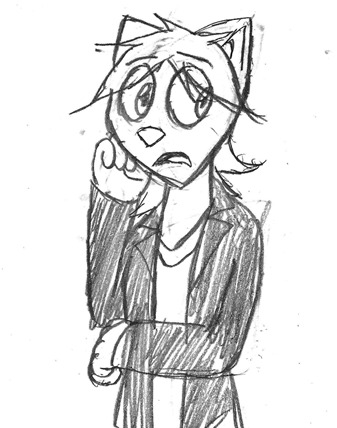
Actually that’d be pretty damn cool honestly. Damn. Taeshi should steal that. That would be fucking awesome and turn this ship around quick…sigh…if only. Anyway, what I’m trying to say here is this.
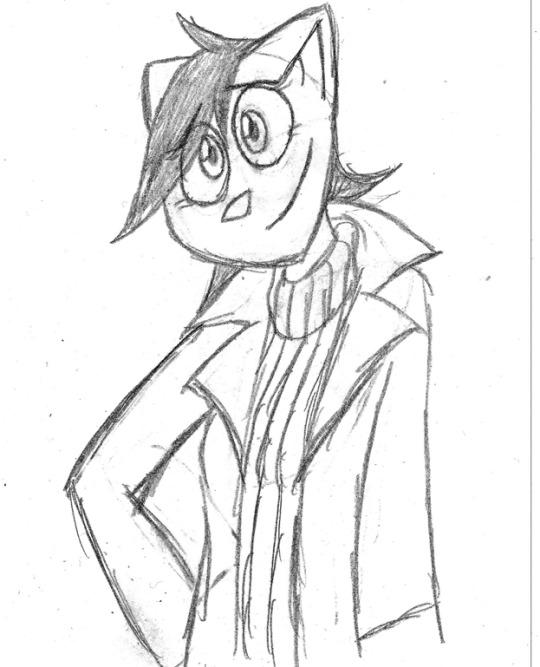
Sandy is a character that I hated. She was a character that I did not care about at all, and didn’t think anything of. I saw her in the comic as a plot device and nothing more. But with creative thinking, care, and love for the comic I reinvented her to be more than that. To be a good character in her own right. With her own message, with her own story to tell. And I believe she has the potential to be just that. To be more than what she is. I didn’t want her to be a lie, or a complete fake of what Mike thought she was. I wanted her to be nice, caring, wholesome, naïve, mature, a little selfish, sneaky, clever, but full of love and surrounded by love and support. She loves her friends, she loves Mike, she loves her job.
And to see her in canon I just…
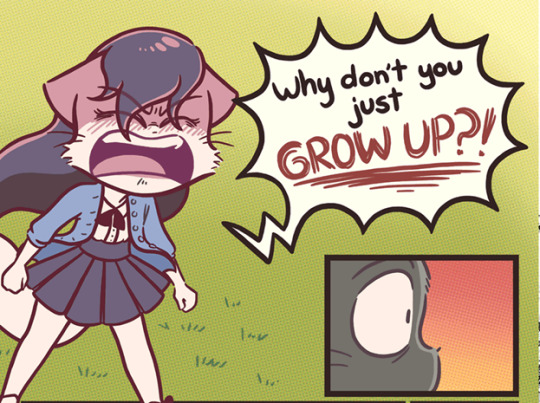
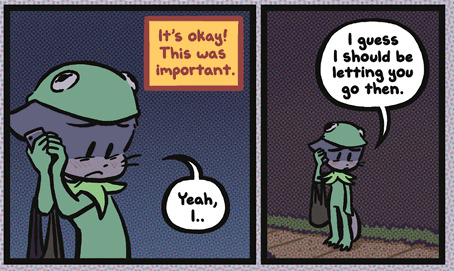
I feel disappointed to see her as nothing but a plot device to stab the reader in the gut with and make them feel bad. I wish she was more. More than an enigma, more than a bitch, more than another person to make Mike feel bad. Sandy could’ve been better. She could’ve been so much better. And I just wish Taeshi did better.
As someone I looked up to, as someone who inspired me… I wish she’d be better than me.
3 notes
·
View notes
Note
I’m legitimately curious why people didn’t like the last Jedi? I saw it and thought it was okay? Is there something I missed or? Like it wasn’t great but it was passable?
ok so i wasnt gonna do this here bc nobody fucking asked but u asked so thank u but also strap in ur ready for a while ride
TLJ spoilers, obviously. also my issues are going to be numbered in no particular order bc my thoughts on this movie are so fucking scrambled but here we go
1. Kyle Ron. First of all fuck Ryeanne for making me see so many goddamn closeups of Adam Driver’s ugly ass face. I did not need to see all that he is so goddamn ugly especially that fucking shirtless scene where he looks like a block of pasty ass pale wood.
But for real, Kylo Ren. I don’t actually take issue with his existence, because Kyle really does excellently represent rich ass white boys who have everything handed to them but throw a hissy fit when they face the slightest adversity an throw tantrums all the time. It’s nice to see a villain that represents most people real-life nightmares instead of like, a Sexy Temptress or Old Evil Man or whatever. That being said, kyle is not given the villain’s treatment in this movie. if you cut out all the scenes where ryan is not actively sucking adam driver’s dick and jizzing all over himself over kyle’s angsty white boy angst, the movie has virtually no real plot (”oh no we are in space with no fuel, nobody is going to do anything except get mad at each other, miscommunicate, and deliberately make all the characters of color worthless while separating Finn and Poe bc fuck the gays”). So much of the movie is spent not just establishing how kyle became kyle (which is good! backstory for villains is good!), but trying to get us to like, sympathize with him? which is the shitty part. I dont care that Luke “”””tried to kill”’’’ (he didn’t) kyle. kyle had turned to the dark side before luke’s mistake. kyle had a million and one chances to change his mind from the start of TFA to the end of TLJ, and he never did. Kyle is an evil guy. We need one of those. He’s a great evil guy bc he’s got so many shitty qualities. But ryin doesnt want us to hate kyle, even tho hes the villain. why the fuck doesnt reean want us to hate kyle? bc rayan is also a shitty little man who thinks giving ur white boy a sob story makes him a sympathetic villain and sidelining ur characters of color will help.
also again the fucking shirtless scene what the shit man that was so gross
2. Will be broken down into A, B, C, etc. bc TLJ treats its characters of color like SHIT.
2A. Finn. Finn gets put in a coma bc why would anyone want to write anything interesting for john boyega its not like hes the MOST BEAUTIFUL MAN and the MOST TALENTED ACTOR who is being sidelined bc ryun hates black people. Yeah Finn is totally into Rey and he wants to save her and is willing to desert the rebellion for her. that happened in the first movie but why give your characters real arcs when you can recycle old ones to jerk off to kyle ron. the rose thing happens, shes like “we can disable the tracking” and like TWO SECONDS after he was dead set on desertion he’s totally down to risk his life for the rebellion at rey’s expense? that sure is a quick 180 with no real reason why and no writing to explain it! then there was the whole “separate finn and poe” thing ryain pulled for the shits and giggles.
2B. Rose. I was pretty chill with Rose, she had a dope backstory, her sister was badass, and I liked that they made that connection off the bat. I’m not mad about anything rayn did with her character but i genuinely believe thats only because i havent thought about it enough yet. give me a week and i’ll figure out how rain fucked it up. open to suggestions.
2C. Poe. Full offense but was I supposed to be mad at Poe for coming up with a plan when that bitch Holdo was like “I’m not gonna tell you my plan sit tight and be convinced we are all going to die :)” i legitimately did not understand how I was supposed to be mad at poe for doing what he thought was best for the rebellion after he asked holdo what the plan was and she was deliberately obstinate and refused to even be like “dont worry i have a plan” she was just like. so dumb. Also poe got thrown around a lot and i am A Little Suspicious of how much physical violence he experienced compared to many other characters.
2D. You guessed what was next! The slaps! Super awesome how the two men of color were slapped by white people!!!! So deep!!!!!!! For real tho uh the second time i saw this movie someone in the audience laughed when poe got slapped by space hitler hux and uh??? not funny. not funny or cute or clever to use the guy you built your entire nazi imagery on to slap the one black man on your cast. i dont care if it was supposed to make us “hate hux” or whatever more. i already hated hux reyn. you could have used that screentime in your 3 fucking hour long movie for something valuable, like giving finn a character arc, or literally anything else besides that goddamn slap. i was livid watching that.
and then with leia and poe? i get that part of the conflict was internal in the resistance and one of the major themes was how failure is the best teacher and all that but like? maybe stop physically assaulting all your characters of color? maybe uhhhh at least think about that first??
2E. like i mentioned before one of the obvious themes was how failure is the best teacher so naturally all the major characters had to fail at something, and then learn from their mistake to be better next time. with luke it was fucking up with kyle, with rey it was being naive enough to think kyle could turn, with poe it was the dreadnaught thing, finn was left out of this because raan dooesn give a shit abt finn bc hes a racist bastard, etc. but it was incredibly transparent how all of the white characters’ mistakes meant either personal losses or something small scale with one person, while the mistakes of the characters of color (poe/finn/rose) were all ones that cost the rebellion the vast majority of their forces. rey got out of her fight with kyle and snoke unscathed. luke got a lot of guilt and character development. What did finn poe and rose get? the deaths of like 99% of the resistance on their shoulders. A little too coincidental that even though rey LITERALLY GAVE HERSELF OVER TO SNOKE she was totally fine a-ok no real scars, finn and poe and rose doing their best to save the rebellion while admiral holdo refuses to tell them anything costs the resistance so fucking much. rey does the DUMBEST FUCKING THING with no real consequences and finn and poe and rose try their best and are punished severely for it.
2F. Really convenient how everything finn, poe, and rose did ended up being useless and just cost the rebellion lives, whereas at least rey’s mishap got snoke killed and taught her a lesson. reeeeaaaalllllyyyyyy convenient how finn, poe, and rose’s plan was a huge waste of time. it would have been much better for us to see an actual plot line with them that contributed to the story and their characterizations instead of “send them on a goose chase, make it pointless in the end, physically brutalize them along the way.
3. R*yl* bullSHIT: ryyn had a really fun time with a lot of very rape-y scenes in this movie. the whole force-connection thing with kyle and rey was soooooo uncalled for, it reeked of non-con fantasies, catered to the r*yl*s like nothing ever before, and was so goddamn gross. the obvious invasion of privacy and lack of consent was nasty, using it as a shitty device to make rey “come around” on kyle was NASTY and that whole thing was nasty. i know im not articulating this well but there was so much about that whole thing that bothered me. i just know reyhan was so fucking into it, inserting kyle into rey’s life, forcing her to completely drop all of her characterization in the first movie to suddenly thing kyle can be good, acting as if rey hasnt seen all the shit and known what hes done. the whole thing was gross and a really obvious example of why men shouldn’t be allowed to direct movies.
4. killing snoke was a dumbass fucking mistake. kyle is a tantrum-throwing temper-losing toddler. snoke was evil and mysterious and shit idk. we knew he was powerful as fuck, he looked like a testicle which is a great villain imo, he was the darth sidious and they killed him off while kyle is still in like. ep2!Anakin levels of angst. i get that kyle is already powerful or whatever but like. hes not cold and calculated the way snoke was. kyle is a good villain, but a weak main baddie bc hes dumb as fuck. he let the rebellion get away bc he was pissed at luke. that was dumb as fuck. kyle is ruined by his emotions, and snoke was a scarier main baddie bc he wasnt so fucking dumb lol
5. it was so fucking long. there were so many scenes that could have been cut or shortened. why did we need to see luke milking the tiddy of that weird alien cow thing. why did we need to see kyle ron shirtless. why did we need so many goddamn shots of the fucking porgs.
6. ya the porgs are cute or whatever but like. that whole “look at how sad the cute big-eyes porg is when chewie is eating his friend” thing was so dumb. i dunno why but i hated that the most. that was the worst thing the porgs did. they were cute but like chill disney u know they like ran algorithm after algorithm to make that porg the cutest it could be with science or some bullshit and like? thats dumb.
7. i get that the humor in star wars movies is shifting but i felt like there was too much of it and it was dumb. a lot of the riffs werent funny and there were too many of them for a star wars film. star wars usually doesnt take itself too seriously, but this one was a little too much for me.
8. there were too many plot twists for shock value. the story went on too long. it should have ended earlier but it didnt. i dont know why ryenn decided to have like 6 different climaxes but it was too much. should have let there be one climax buddy. thats it.
9. holdo. besides holdo being the white feminist icon why didnt she just fucking tell poe the plan. why. why was so deliberately obstinate when it was doing no good. like yeah of course poe sent out a crew to try to save the rebellion all u told him to shut up and let you handle it! obvously what she did in the end was badass or whatever but like uh hun next time dont be a piece of shit and then get mad when people react to you being a piece of shit. i would have been okay with all that happening if holdo wasnt treated like some hero who never made any mistakes. she did make a mistake, and that was refusing to tell poe what her plan was when she knew he was absolutely the type to do whatever he could to save the rebellion whether he had her permission or not. also apparently holdo is a lesbian or bi or not straight or something in like the comics or whatever and like 1. classic bury ur gays but also 2. no more word of god gay characters if a character is not gay in the movies i will not give you the gay cred for it sorry homophobes
10. i didnt buy the story w luke and kyle at lukes jedi training facility or whatever. surprisingly, i was ok with lukes story line and character development, and actually agreed with it for the most part, but i just like. i dunno i didnt feel like that was something luke would do. not because luke is infallible (even tho he is my gay dad who has never done anything wrong ever) but because the entire original trilogy is luke believing darth vader could be saved. and while im not opposed to luke changing his mind about whether or not everyone could be turned away from the dark side (luke was young and optimistic in the original trilogy, and as he grew older he would learn more about the jedi and their history like the whole speech he gave rey about how the jedi have to end bc theyre lowkey shitty). i actually kind of liked luke’s hot take on the jedi, because it was lowkey my hot take on the jedi (esp the prequels jedi who were shitty as Fuuuuuck but we are ignoring the prequels for now lbr) but also because i could believe it was a view luke would come to as he aged. but impulsively drawing his lightsaber to kill kyle before he had actually done anything bad, after suspecting that kyle had darkness in him for a while, even though he felt like he had failed? it just didnt feel like luke to me. i felt more like raeyn had chosen that particular backstory to try to make kyle a more sympathetic villain rather than give a believable and in-character back story for the characters. i understand that luke’s failure ultimately has to lead to the creation of kyle ron in this story line, but that didnt feel like the right failure to me. maybe this is just me being nitpicky but that felt off to me too and i dont know if i can quite pinpoint why.
11. rey was a dumbass fucking bitch in this movie. rey could not be a dumbass fucking bitch to survive as a scavenger who was orphaned at birth on jakku. rey would have had to be smart and not as fucking DUMB as she was in this movie. now im getting heated so i cant articulate this well but she just did so many dumb things that anybody who had to raise themselves would have never done. she would never have delivered herself over to kyle ron like what a dumb fucking idea. who wrote this goddamn movie. fuck u ryeen.
12. why did yoda come back as a force ghost. where is anakins force ghost. he would be so fucking pissed at kyle right now. he would be mad as hell. he would have ended this thing. he would have called kyle out like the shitdickbitch he is and put him in his place. i get that yoda is more like ancient and orginal star wars jedi knowledge shit or whatever and like more of an authority on the jedi but like anakin is off in like force ghost hawaii drinking force ghost martinis while his shitty fucking grandson is being a piece of shit?? nah man anakin would have shut that shit down they better bring him back for ep IX and i expect hayden christensen himself to show up to bitch at kyle about what a fucking dumbass he is.
tbh theres probably more like i know there’s a ton of little things i hated but as scathing as this review is there were things i liked. visually speaking it was a very beautiful movie when we werent getting atrocious close ups of adam drivers ugly ass face. i originally hated but have come to appreciate the darker tone, since it mirrors the mood of TESB in that the rebellion seems dead but obviously isnt bc this is star wars. i liked luke. i dunno. i had a lot of issues with the movie obviously. to be quite honest i cant actually think of anything else i liked atm which is telling.
anyway if anybody actually reads this long ass fucking post feel free to respond with what you hated abt TLJ
123 notes
·
View notes
Text
Blog no. 3
Hundreds of holes
Heavy plate carried alone
Crying bird
Giant cheese
Heavy brain
Nail on the Head
A million of eggs in one basket
An ocean of food in one plate
Time flies so fast
Heart was played like a card
Silver words came out from his mouth
Eyes filled with emotion
A waterfall beans
Ear Tied
Time is Gold
I had the cat by the tail
Fish out of the water
It’s raining cats in the city that’s why I got one
His walk was as noisy as a fallen metal can
Walking on pins and needles
Finding shadows
Cherry in a piece of cake
Heel to the ground
Walking with a pointed toe
Drag feet one’s
Broken leg by suffering
Chasing Grace
Notes: Most Commonly Used Figure of Speech
1. Alliteration is the repetition of initial sounds in neighboring words.
Example: Fresh fern fronds from the forest
2. Allusion is a figure of speech that quickly stimulates different ideas and associations using only a couple of words, thus making an indirect reference.
Example: Describing someone as an “Adonis” makes an allusion to the handsome young shepherd loved by the goddess of love and beauty herself in the Greek myths.
3. Anaphora is a stylistic device that consists of repeating a sequence of words at the beginning of neighboring clauses to give emphasis.
Example: You are lovely, you are gorgeous, you are pretty, you are glorious, you are, you are, you just are!
4. Anticlimax refers to a figure of speech in which a word is repeated and whose meaning changes in the second instance.
Examples: He got his dignity, his job, and his company car.
In the car crash, she lost her life, her car, and her cell phone.
5. Antiphrasis is a figure of speech in which a word or phrase is used to mean the opposite of its normal meaning to create ironic humorous effect.
Example: She is 65 year young.
6. Antithesis is a figure of speech that refers to the juxtaposition of opposing or contrasting ideas. It involves the bringing out of a contrast in the ideas by an obvious contrast in the words, clauses, or sentences within a parallel grammatical structure.
Example: To many choices, too little time.
7. Apostrophe is an exclamatory rhetorical figure of speech in which a speaker or writer breaks off and directs speech to an imaginary person or abstract quality or idea.
Example: Oh, moon! You have seen everything!
8. Assonance is a figure of speech that refers to the repetition of vowel sounds to create internal rhyming within phrases or sentences.
Example: A certain purple curtain, captain. (note: cer in cetain, pur in purple, and cur in curtain. Also tain in certain, curtain, and captain.)
9. Climax refers to the figure of speech in which words, phrases, or clauses are arranged in order of increasing importance.
Example: Three things will remain: faith, hope, and love. But the greatest of these is love.
10. Euphemism is a figure of speech used to express a mild, indirect, or vague term to substitute for a harsh, blunt, or offensive term.
Example: saying “passed away” for “died”
Saying “in between jobs” to mean “unemployed”
11. Epigram refers to a concise, witty, memorable, and sometimes surprising or satirical statement.
Example: Oscar Wilde’s “I can resist everything but temptation,” or “I am not young enough to know everything.”
12. Epiphora (or epistrophe) is a rhetorical device that consists of repeating a sequence of words at the end of neighboring clauses to give them emphasis.
Example: “…a government of the people, by the people, for the people. (Note: The phrase the people is repeated twice after it was first mentioned.)
13. Hyperbole is a figure of speech that uses exaggeration to created emphasis or effect; it is not meant to be taken literally.
Example: I told you a million times to clean your room.
14. Irony is a figure of speech in which there is a contradiction of expectation between what is said and what is really meant. It is characterized by an incongruity, a contrast, between reality and appearance.
Example: The explanation is as clear as mud.
15. Litotes is a figure of speech consisting of an understatement in which an affirmative is expressed by negating its opposite.
Example: Instead of saying that someone is “ugly” you can say that someone is “not very pretty.”
Instead of saying that the situation is “bad” you can say that it is “not good”.
16. Merism is a figure of speech by which something is referred to by a conventional phrase that enumerates several of its constituents or traits.
Example: saying “young and old” to refer to the whole population
Saying “flesh and bone” to mean the whole body
17. Metaphor s a figure of speech that makes an implicit , implied or hidden comparison between two things or objects that are poles apart from each other but have some characteristics common between them.
Example: The planet is my playground. The Lord is my shepherd.
18. Metonymy is a figure pf speech in which a thing or concept is not called by its own name, but by the name of something intimately associated with the thing or concept.
Examples: Using “Malacaňang” to refer to the president or the government
Saying “a hand” to mean “help”
19. Oxymoron is a figure of speech that combines incongruous or contradictory terms.
Examples: open secret, virtual reality, sacred profanities
20. Personification is a figure of speech in which a human characteristics are attributed to an abstract quality, animal, or inanimate object.
Example: Red punctuates and makes bold statements, says something, and means it like an exclamation point!
21. Simile is a figure of speech directly comparing two unlike things, often introduced the word, like or as.
Examples: A smile as big as the sun. She prays like a mantis.
22. Synecdoche is a figure of speech in which a part of something is used to represent the whole of something is used to represent part of it.
Examples: Sixty hands voted. (The part “hand” is used to refer to the whole person)
The country supported the president. (The word “country” is used to refer to the people.)
23. Understatement is a figure of speech used by its writers or speakers to deliberately make a situation seem less important or serious that it really is.
Examples: A nurse to give an injection saying, “It will sting a bit.”
To describe a disappointing experience, a participant may say, “It was …different.”
LITREADITURE!
Look for literary pieces and take note some lines in it that expresses figures of speech listed below. Write your answers on the space provided. (One example for each)
1.ALLUSION: “You’re acting like such a scrooge!” Title: A Christmas carol
Author: Charles Dickens
2.ANAPHORA: “ In every cry of every man, In every infant’s cry of fear, In every voice, In every ban, The mind – forg’d manacles I hear. Title: London
Author: William blake
3.EUPHEMISM:” When the present has latched its postern behind my tremulous stay, And the may month flaps its glad green”. Title: Afterwards
Author: Tom Hardy
4.EPIGRAM: “So all my best is dressing old words new”. Title: Sonnet
Author: William Shakespeare
5.LITOTES; “Though I have seen my head brought in upon a platter, I am no prophet- and here’s no great matter”. Title: The Love song
Author: Alfred Prufrock
6.METONYMY: “The pen is mightier than the sword”. Title: Richelieu
Author: Edward Bulwer Lytton
7.OXYMORON: “Down the close darkening lanes they sang their way to the siding-shed, And lined the train with faces grimly gay. Their breasts were stuck all white with wreath an spray as men’s. dead”. Title: Romeo and Juliet
Author: Romeo and Juliet
8.MERISM: “There is a working class- strong and happy- among both rich and poor; there is an idle class- weak, wicked and miserable-among both rich and poor”.
Author: John Ruskin
9.ANTITHESIS- “Love is an ideal thing, marriage is real thing”. Author: Goethe
10.IRONY: “I will not marry yet; and, when I do, I swear it shall be Romeo, whom you know I hate, rather than Paris”. Title: Romeo and Juliet
Author: William Shakespeare
JOURNAL WRITING:
Sonnet 130
William Shakespeare
The tone of sonnet 130 is sarcastic and insulting. The speaker is taking a risk by wooing his woman through insults. The speaker compares his lover’s body to a series of beautiful things, shows that the speaker is telling that the body of the love of his life is less beautiful that the things being compared. These comparisons revealed that the girl is not that appealing. The diction of sonnet 130 or the language being used is all about comparisons, that is obvious from the start till the end of the poem that he’s comparing the love of his life to the things that surrounding him. The poem shows the standard of beauty and the speakers definition of beauty. Throughout the poem, he talks about the physical appearance of his mistress that do not match the standard of the speaker. The figures of speech being used in the poems are, alliteration, consonance, hyperbole and imagery. The poet emphasizes how unlike his mistress’s attributes are to various tropes of romantic poetry. Most of the time the speaker uses simile just like what he says “Mistress eyes are nothing like the sun”. The speaker seems to be very visual in a way that he’s always comparing his mistress in anything that he sees.

1 note
·
View note
Link
Very interesting article. I think a 70-80% upper tax bracket achieves much the same thing, but the analysis of societal effects of wealthy people and the response of a healthy society has a very interesting and enlightening perspective.
Why the Rich are not 'Job Creators'
It is sometimes thought that the rich are necessary to the flourishing of a free market economy, that because they have more wealth than they need for their own consumption it is their investment of capital that makes the economy spin around and create jobs. Thus the claim that there is a trade-off between democracy and material prosperity. But that ‘job creator’ thesis is out of date and back to front.
First, while in Adam Smith's time it might have been true that economic development required capitalists to reinvest their profits this was because everyone else was too poor. But these days the economies of democratic societies are characterized by a broad middle-class whose savings are quite sufficient for funding business development and expansion (such as through the share-ownership of our pension funds or the bank loans backed by our deposits).
Second, the greater the wealth inequality, the worse we may expect the economy to perform. A flourishing economy requires customers as well as investors. If the gains of economic productivity are overwhelmingly transferred to some small group (as profits) that means that they don't go to ordinary people (as wages). (For example, since 1979 all the productivity gains of America's economy have gone to the richest 1%.) The implications are, first, that economic growth does not increase national prosperity because it does not increase the economic command of ordinary people to satisfy our wants (which is how Smith defined the wealth of nations). And, second, economic growth itself will eventually suffer since high inequality limits the extent of the market (fewer customers) and thus the scope for innovation.
But the biggest problem is the capitalists themselves, who use their dominance of politics to legitimate and entrench their momentary competitive advantages into de facto quasi-monopolies and effectively levy a redistributive tax on society as a whole. The interest of the plutocratic elite is to widen the market but limit the competition; to do what Bill Gates did to Netscape and Carlos Slim did to Mexico's telecoms industry. Consider the re-construction of America���s financial services industry over the last 30 years. As the number of firms went down, favourable laws went up, converting the industry into a rentier system in which the costs of financial services to the economy as a whole rose, profits rose, and risks were socialized.
This rentier capitalism doesn't have the same virtues as the free market kind proposed by Smith and endorsed by most contemporary economists. It undermines the policing required to maintain real – fair and rivalrous - competition. It misallocates the country's wealth and talent, by funnelling it away from productive enterprises and into rent-seeking enterprises that harvest the productivity of others.
What to do about the rich
I think it is clear that the rich are a burden and a danger to our democratic society as a whole. (If you're still not convinced, read the now classic essay Of the 1%, by the 1%, for the 1% by the economics Nobel prize winner, Joe Stiglitz.) But that doesn't tell us what to do about them. Some people would say that we should tax the rich into the middle-class, but this proposal has never really got off the ground because it seems punitive and unfair, and not only to libertarian moral philosophers. After all, the rich got rich by playing - and ‘winning’ - the economic game according to the rules we set. It's not their fault that their wealth is toxic to democracy. Fortunately I am not concerned here with fairness and social justice, but with the somewhat simpler but more urgent existential threat that the presence of the rich poses to a democratic society. I'm against the rich, but I don't care about their money. And that allows me to advance a different kind of proposal than one normally sees in this debate: the simple rule that no-one can be both a member of our democratic society and rich.
A good way of thinking about what a democratic society is and should be, and how its members relate to it, is through the device of the social contract. A social contract is a hypothetical agreement to form a political association for the mutual advantage, security, and justice of all its members. The significance of this idea is that it allows us to scrutinize whether our current social arrangements resemble what we would have deliberately chosen to create if we had had the chance. Or whether we would have chosen something better (John Rawls' project). In Rawls’ hands the social contract is a device for generating a unique agreement on the basic structure of a just society by making explicit our intuitions about what a just democratic society requires.
But one can also use the social contract device more crudely, to draw our attention to the preconditions for and legitimate authority of a democratic society. Though we may not follow Rawls’ controversial argument for what an ideally just democratic society would look like, we may all readily agree that some features are incompatible with the persistence of any democratic society in which such questions of justice might be debated. Plutocracy seems such a feature, since it is incompatible with freedom from domination between citizens or political equality in social choice.
The idea of the social contract also directs us to think of our democratic society as a kind of private club for the mutual benefit of its members. (Indeed, this is explicitly how we often analyse it when thinking about immigration [previously].) Such a club has the legitimate authority to enforce its constitutional commitment to democracy and take action against members who undermine it. Hence my modest proposal. We should first identify with some precision the category of what it seems reasonable to call the rich i.e. those people whose capabilities for independence from and command over the rest of us crosses the threshold between enviable affluence and aristocratic privilege. Then, when anyone in our society lands in the category of the problematic rich we should say, as at the end of a cheesy TV game show, "Congratulations, you won the economy game! Well done." And then we should offer them a choice: give it away (hold a potlatch, give it to Oxfam, their favourite art museum foundation, or whatever) or cash out their winnings and depart our society forever, leaving their citizenship at the door on their way out. Since the rich are, um, rich, they have all the means they need to make a new life for themselves elsewhere, and perhaps even inveigle their way into citizenship in a country that is less picky than we are. So I'm sure they'll do just fine. Still, we can let them back in to visit family and friends a few days a year - there's no need to be vindictive.
1 note
·
View note
Photo

Thanks to Scoot, we recently had the opportunity to experience the best that Berlin had to offer in terms of dining, shopping and history during our 5 day trip to Berlin and not have to bust our airfare budget. Yes, you heard right – Scoot – a low cost airline flies non-stop to Berlin from Singapore and this is not the first time that they are doing long haul flights (Scoot is also doing long haul flights to Athens in Greece and Honolulu in Hawaii, USA).
Over the next few blog posts, I will be sharing with you our various interesting experiences in Berlin but for this post, I have some suggestions for the foodies who are keen to check out the diverse dining experiences in Berlin and I have 11 of them!
But before we talk about dining in Berlin, I just want to share some tips on enjoying a long haul flight on Scoot. Being a low cost airline means we get bargain fares with Scoot (one way fare to Berlin from Singapore starting from S$239!) but that also means that the usual amenities that we would expect with a full-fare airline e.g. meals, in-flight entertainment, will not be complimentary. But if you add up the costs of buying these extras, you have still scored a huge bargain for a flight to Berlin!
The flight to Berlin from Singapore is almost 13 hours long so do preorder your long haul meal bundle or else you can get quite hungry during the flight. Preordering ensures that you get the meal you want and there are usually discounts or certain perks (for example, you may get a complimentary Haagen Daaz ice-cream or cookies with your meal). The flight departs from Singapore to Berlin at 12.25am and the first meal service (where a light meal of chicken sandwich wrap was served) will start around 1 hour+ after take-off (around 2am). There is no seatback inflight entertainment – you will have to bring your own entertainment or sign up for the ScooTV access (US$11 or about S$15) for the duration of the flight (but you will need to bring your own device e.g. iPad, phones and if you are using Apple devices, ensure that you had downloaded the ScooTV app before boarding your flight; for android devices, you can download the app from the Scoot Wi-Fi portal for free during the flight). If you need to charge your devices (nowadays whose phone can last for 13 hours on a single charge right?), you can buy in-seat power for about US$7.
To help yourself get as comfortable as possible and to sleep well during this long haul flight, I would recommend getting a Scoot Snooze Kit which comprises a very comfortable blanket and eye mask and inflatable neck pillow. Pre-purchasing this snooze kit before your flight will save you S$5 – otherwise you can buy the Scoot Snooze Kit onboard for S$23.
Our second meal service came in at around 3 hours before we landed at Berlin and it was roast beef with potatoes (there are other choices too – chicken, vegetarian etc.). This tasted very good as the beef is very tender. The sides include a potato salad and yoghurt. Scoot’s long haul meal bundle for flights to Berlin comes in non-vegetarian and vegetarian options and includes:
Premium Meal Combo which includes a deluxe meal, 2 sides and a drink.
Light Meal Combo which includes a light meal, a snack and a precupped juice.
This long haul meal bundle is available for preorder only.
Our Scoot flight to Berlin from Singapore landed at Berlin Tegel Airport at 7.20am – perfect timing to start a long day of fun at Berlin. The best part about landing at Berlin Tegel Airport is the airport’s proximity to the Berlin city centre. After clearing immigrations and collecting your baggage, you can be at your hotel in the city centre within 20 minutes! Our basecamp for our trip to Berlin was Capri by Fraser Berlin – we had a great staycation at Capri by Fraser Singapore (the one beside Changi City Point) and the Berlin one was just as good an experience.
Now, back to the topic at hand – Interesting and Diverse Dining Experiences in Berlin, we will of course start with German cuisine:
If you love desserts, don’t miss the Chocolate Lava Cake served with ice-cream served at The Grand.
Address: The Grand, Hirtenstraße 4, 10178 Berlin (nearest U2: Rosa-Luxemburg-Platz)
Address: Brauhaus Lemke am Alex, Karl-Liebknecht-Str. 13, 10178 Berlin (nearest S+U: Alexanderplatz)
From the dizzying height of its viewing platform, you have spectacular 360-degree panoramic views out across the entire city – and beyond. You can also chill out with cocktail from Bar 203. You can also have dinner at the rotating restaurant just one floor above the viewing platform
Address: Panoramastraße 1 A, 10178 Berlin (nearest S+U: Alexanderplatz)
The Currywurst has an interesting origin: During 1949 in Berlin, a resourceful German housewife, Herta Heuwer, traded some spirits with British soldiers for ketchup. She then created the dish – composed of German sausage, or wurst, sliced and doused in ketchup and sprinkled with curry powder and created the currywurst which became an overnight success and eventually a staple, mainly amongst construction workers who valued its high protein content and low cost.
Address: Curry 36, Hardenbergplatz 9, 10623 Berlin (this is near the Zoo or the BIKINI Berlin which we will talk about later – nearest U2: Berlin Zoologischer Garten)
or
Curry 36, Mehringdamm 36, 10961 Berlin Kreuzberg
TIM RAUE serves Asian-inspired cuisine that can be characterized as a blend of Japanese product perfection, Thai aromas, and Chinese culinary philosophy. The aim of his dishes is to provide energy and joie de vivre. Guests are invited to a deliberately simple ambience influenced by the urban atmosphere of Berlin. The Michelin guide awarded Tim Raue’s restaurant with two Michelin stars.
We started our dining experience with the Ikarimi Salmon served with buttered stock of tomato juice & marukan rice vinegar, compote of tomato & star anis and green anis. The dish is served lukewarm, keeping the salmon tender – the salmon is soft and melts in your mouth. The various flavours of vinegar, tomato gives you a mix of different tastes with each bite.
Next we had the Langoustine served with wasabi mayonnaise cantonese style. This is like our Singaporean equivalent of wasabi prawn – those that you can order from zi char stalls at hawker centre, although the quality at Tim Raue is a lot better – instead of prawns, Norway lobster meat (langoustine) is used and it tasted very fresh. The wasabi mayonnaise sauce is perfect with the langoustine – some zi char stalls in Singapore makes the wasabi sauce overwhelming (as if you are swallowing wasabi) but here at Tim Raue, its just gives a tinge of wasabi taste and that is good enough.
Next, we had Sate Chicken – or we call it Satay Chicken. I am very surprised to taste such familiar tasting food all the way in Germany. The chicken is tender and when eaten with the satay sauce, it tastes so good!
We wrapped up our meal at Tim Raue with dessert which comprises Quince sherbet, macadamia nougat and passionfruit. It is a good mix of taste – sweet and sour.
A 4 course menu for lunch at Tim Raue like the above will cost 68 Euros + 19% tax. You get a choice of dishes to make up the 4 courses – the 3 course menu is the cheaper option at 58 Euros. Do note that if you select the wasabi langoustine, that will cost an additional 12 Euros to the 68 Euros for a 4 course menu.
Address: Restaurant Tim Raue, Rudi-Dutschke-Straße 26, 10969 Berlin (near Checkpoint Charlie)
Address: Night Kitchen, Oranienburger Str. 32, 10117 Berlin (nearest S-station: Berlin Oranienburger Straße station)
Address: Casalot, Claire-Waldoff-Straße 5, 10117 Berlin
Just a short aside on the THE ONE Grand Show at Friedrichstadt-Palast, if you want to catch one of the most lavish show in Europe on one of the biggest stage in the world, then you should not miss the ONE Grand Show. An iconic part of the ONE Grand Show performance is the more than 500 daring, extravagant, and glamourous costumes designed by Jean Paul Gaultier, one of the great stars of Parisian haute couture. The scale of this performance is massive in many ways – more than 100 artists on the world’s biggest theater stage and a production budget of more than eleven million euros.
Most of the singing is in German but you should be able to interpret from the music and costumes what is going on but in case you don’t, here’s my quick take on the performance. THE ONE Grand Show blurs past and present in a vibrant, euphoric waking dream. You will follow a young man who struggles with his inner emotions – anger and curiosity as he rekindles the splendour and glamour of times past in his mind’s eye while everything dissolves, floats, and spins in front of him, all leading back to the one person who means everything to him – THE ONE. I know very chim (deep-meaning in local Singaporean colloquial terms) but this is a show where you get amazed and surprised by the myriad of costume and death defying acts by the performers. It is a good mix between a typical circus act and dance performance and musical (the latter you will appreciate better if you know German).
Address: Bikini-Haus, Budapester Str. 38-50, 10787 Berlin (nearest U2: Berlin Zoologischer Garten)
For a more traditional food market, don’t miss Markthalle Neun (Market Hall 9) in Kreuzberg on Thursday because of Street Food Thursday. On Thursdays from 5pm to 10pm only, the various stalls compete with each other with their culinary delicacies, but it is you who are the winners. This is truly an international event as you get to experience British pies, Thai tapioca dumplings, Mexican tacos, Allgäu cheese spaetzle or Nigerian FuFu. It gets really crowded though so seats are very limited.
If you need help navigating the culinary gems that Berlin offers on this exciting street food tour through the district of Kreuzberg, check out the Food Tour with Fork & Walk by Dov Selby. If you check out his website, you will notice that there are lots of different food tours to meet your needs, be it whether you are a vegan or coffee connoisseur, there is a food tour for you.
We went on a Evening Food Tour with Dov where he showed us some of the best street food stalls in Markthalle Neun, for example – these tofu burgers by Tofutussis and …
… amazing cheese sandwiches by Alte Milch
Adana Kebap Yogurtlu – Minced meat on the skewer with yogurt, tomatosauce, gegrilled tomatoes, pepper and special bread
Künefe – Pastry mozzarella cheese doused with sugar syrup
Künefe is a crispy cheese-filled dessert made with kadayıf, which is a traditional shredded wheat dessert with pistachio filling. Native to the southeastern parts of Turkey in a area named Hatay. This is a very sweet and addictive dessert
Address: 37, Admiralstraße 36, 10999 Berlin, Germany
Berlin WelcomeCard gives you access to all public transport as well as discounts on selected tours and museum. Ranging from 2 – 6 days, these will definitely come in handy when exploring Berlin. Just remember to validate your ticket before you take your first ride with the bus /U-bahn.
Our spacious @berlin apartment with kitchenette and comfortable bed and refreshing rainshower – perfect rest stop after a long flight from Singapore to Berlin with @ @visit_berlin
A post shared by Zhiqiang and Tingyi (@passportchop) on Jun 20, 2018 at 2:04am PDT
Read on if you would like to know what we ate on our Scoot flight back to Singapore from Berlin. Our flight took off from Berlin at 9.40am and the first meal service is Currywurst and…
… for our second meal service (a few hours before we arrive at Singapore) – Turkey meatloaf with rye bread.
#><strong>1.#0000ff;#><strong>3.#>5.#><strong>7.#><strong>9.#><strong>10.#>And#ff6600;#0000ff;><strong>2.#0000ff;><strong>4.#0000ff;><strong>6.#0000ff;><strong>8.#0000ff;>(</span>Street#0000ff;><strong>11.#000000;>Capri#FFF;#F8F8F8;#000;#flyscoot#Scoot2Berlin#BallinInBerlin#capribyfraser#c9c8cd;
0 notes
Text
AN OPEN LETTER TO UNITED STATES’ PRESIDENT, Mr. Donald Trump
Dear Honourable Sir,
A blessed New Year to First Lady, Mrs. Trump and to you and your Family.
RE : DEVELOPMENT AS A MEANS TO DETER UNBRIDLED MIGRATION

Image courtesy ThoughtCo
A. OPENING
It would be in America and the world’s best interest to bring political, economic and social development, and hence, peace to dysfunctional countries. Unbridled migration is a product of failed states, characterized by conflict, widespread political corruption, and ineptitude of a ruling class, who is self-serving and inward-looking.
The United States of America has been a beneficiary of migrant labor for centuries. These good folks have and continue to help sustain the American Dream.

Image courtesy Antioch University, Santa Barbara
B. The making of a Wall or living in Fear?
The subject of thousands of migrants crossing the border into the U.S. is presently a major political issue. This is understandable, particularly on two related fronts :
1. The American economy is mature, requiring a controlled flow of acceptable and law-abiding migrants to assure a constancy between domestic and foreign labour needs.
2. Related to the first, your appeal during the presidential campaign to Make America Great Again (MAGA) with a strong emphasis on optimizing domestic resources, especially American labour, resonated with many voters. You are intent on keeping to the promises you made during the campaign. This is your prerogative as President, to which you have said you are duty-bound.
However, many more migrants will continue to make the journey to the U.S. This is inevitable so long as their native countries remain dysfunctional or are under-performing. Whether this is deliberate or not, to suit the labour needs of the developed economies, is for the professional pundits to debate. For our purpose here, I would prefer to address solutions to reconstructing dysfunctional or under-performing economies as a way to stem migration. A Win-Win, if you will.
C. SOLUTION TO MASS MIGRATION

Image courtesy The Intercept
“Endless wars, especially those which are fought out of judgement mistakes that were made many years ago, and those where we are getting little financial or military help from the rich countries that so greatly benefit from what we are doing, will eventually come to a glorious end.”
- U.S. President Trump, Jan 08, 2019 @ Twitter
This statement by you, Sir is one of the most astounding admissions by a U.S. President. I cannot agree more. America has been in more wars than any nation in her relatively short history. The question which begs to be asked is this – Why is that? Why are you fighting in wars so far from home, sacrificing your young soldiers? How is a Libya, Iraq or Afghanistan an existential threat to America? I will reiterate a point I made to your Ambassador previously – these wars are fought because American leaders define the national interest within very narrow limits, seemingly excluding the interest of the general population of the United States. The humanitarian crises these wars create, including the outflow of refugees from a previously stable and relatively prosperous country like Iraq or Libya, are avoidable if political and moral leadership had existed in the Atlantic Alliance, to which America leads.

Image courtesy Cartoon Movement
You have offered a wonderful solution to the issue of uncontrolled migration – stop the wars. That’s a great first step. The next step then is to work with the international community to create conditions for the political, economic and social development of every dysfunctional or under-performing country in the world. It never ceases to amaze me how China, whose economy trailed most countries thirty years ago could out-perform every one thereafter. She continues to this day. This says much about the modern-day leadership of the Chinese, as it does about those perpetually under-performing economies’ of the world. In this respect, I appeal to you to use the great influence of the United States to help under-performing and war-ravaged economies to re-construct and to develop diligently for the general benefit of their people. Corruption, self-serving ruling elites, exploitative labour and predatory financial practices, must all be eliminated or at least diminished. Question is, do we have the political will to do this on an even-handed way, without fear or favour to friendly or unfriendly nations alike?
D. CONCLUSION

Image courtesy TEDxGhent
Mr. President, migrants and refugees are victims of bad circumstances, mostly bad or corrupt government and environment in their native lands. Their choices if any, are dire. I am sure you are well aware of this. The law-abiding migrant deserves better.
A Wall is admittedly a separation device. It offers security, comfort and privacy. We all live in rooms shielded by walls for this purpose. We also recognize that at times, in fact, most times, we step out of the room to mingle with family, friends and other folks. Our sanity and self-interest demand we do this, for to permanently separate or isolate humanity is to ignore our civilizational origins and to undermine our very diverse spirits and inclinations for community and social contact.
It is said that America is a country of immigrants. I am sure your forebears agreed with this statement, having originated from the European continent. They arrived in America seeking a better life. I am also sure they would never have dreamt that a descendant would one day become the President of the great country they had adopted. But that’s the beauty of America. It is a Land where anyone could fulfil her dream, with hard work and passion.
America was built on its egalitarian values. A wall however, is a symbol of divisiveness, bred on FEAR. It didn’t stop the “barbarians” from invading China over the centuries. What it did do though at that time was to make China an in-ward and in-bred civilization, and that ultimately caused her downfall.
Dear Mr. President, I apologize for this lengthy letter. As a foreigner who got my priceless college education in America, I have the highest regard for your great Nation and her People. I remain optimistic about America’s future. Perhaps that’s because I was infused with American optimism during my college years.
Thank you, Sir.

In the Spirit of David Cornelius Singh
Harmohan Singh
David’s father
Email : [email protected]
0 notes
Text
Scattered Notes on THE [email protected]
This post is a collection of lightly edited notes on each episode of the drama, THE [email protected], which began airing on SBS Plus and Amazon Prime on April 28, 2017. It is organized chronologically, with the older episodes at the top and newer episodes at the bottom. New notes are added to this post in the week that follows each episode.
Although this post does not include synopses of any of the episodes, be forewarned that it will likely include spoilers for a given episode.
Episode Index
Episode 1 / Episode 2 / Episode 3 / Episode 4 / Episode 5 / Episode 6 / Episode 7 / Episode 8 / Episode 9 / Episode 10 / Episode 11 / Episode 12
Note: There are 24 episodes in this series but I stopped watching the series after episode 12
THE [email protected] : Episode 1
Aired: April 28, 2017
Spoiler Note: In addition to discussing the first episode of the series, the following notes also make reference to the following idol anime series: Wake Up, Girls!, The iDOLM@STER, Love Live! School Idol Project, and Love Live! Sunshine!!
1. Presented without comment, although with the full knowledge that the press release and publicity surrounding the [email protected] series has very deliberately identified their source material as the IDOLM@STER video game, not the anime series.
Summary of THE [email protected], via Amazon Prime’s Instant Video page for the series:
Only those who survive can make their debut as a girl group! The series follows the story of 11 girls as they fiercely compete and undergo vigorous training to become idol stars.
Summary of The iDOLM@STER, via Crunchyroll’s page for the anime:
THE IDOLM@STER follows 13 girls from the 765 Production Studio, whose sole goal is to become the top idols in the Japanese entertainment industry. Along with the laughs, struggles and tears that are inherently part of this journey, you will cheer for the girls of IDOLM@STER as they climb their way to the top!
2.Given the intertextuality of Japanese pop culture, It is not uncommon for the rival group to the main group in an anime to be based on a actual, real life group. For example, in Wake Up, Girls!, the rival to the group Wake Up, Girls’, is i-1, who is based off of AKB48. In Love Live! School Idol Project, μ's rival, A-RISE is supposedly modeled off Perfume, while in Love Live! Sunshine!!, Saint Snow is often seen as invoking Baby Metal, specifically the members, Yuimetal and Moametal.
With The iDOLM@STER anime though, there is a non-specificity to their rival, the boy group JUPITER, as in they have no clear source material.
I would argue that this applies to Red Queen, who is being set up as the rival group in THE [email protected]. They are not modeled on any of the groups the members — who are all actual idols in their own right, continuing the series blurring of fact and fiction — hail from, nor any other group. If anything, the closest thing they resemble is one of the cross industry Colors of K-pop Unit Groups that were formed for the 2012 SBS Gayo Daejun and were all named for a color (Dazzling Red, Mystic White, and so on). This is a bit too much of a stretch though, with the parallels shallow and is likely much too obscure a reference for a series that is viewable to anyone outside of Korea as long as they have Amazon Prime.*
*Although Amazon boasts that its Instant Video service is now available more than two hundred countries and territories, I saw some tweets on people outside the United States who were having trouble watching the show.
3. As I have written about both above and in another post, a big part of this drama’s premise is that it allows real life to bleed into what is an otherwise fictional story. And yet when it comes to the depiction of the idol industry here, it feels more like a caricature, with it both unforgiving and also unbelievably seedy, than grounded in reality. For example, Red Queen makes their first comeback since their leader Suah died, on the anniversary of her death would never happen in k-pop today because agencies would be far too conscious of the optics of such a move.
4.There is one scene in this first episode that felt familiar though. It happens during Youngjoo’s monologue where she discusses both her dream of being an idol and her commitment to it, training even on the day her father died. During the voiceover narration she is shown in a darkened dance studio, alone (because the trainee is always alone), dancing in front of the mirror.
This seems so familiar because I have seen other versions of it before. There is a similar shot in the video for Yoon Jong Shin with Y.E.T’s “Trainee” and in one of the promos for the first season of Produce 101. It is a stock image of the trainee experience.
The message of such images is much the same of the dream rhetoric that is often used to describe the trainee experience: being a trainee is a lonely, isolating experience and it is all up to them through their hard work to make it happen. Other trainees, after all as the first episode of The [email protected] shows, are not always friends. They betray each other as fellow trainee Nakyung does when she leaves the future members of Real Girl Project to join Red Queen, and are often vying for the same limited number of spots spot, all trying to reach the same dream.
THE [email protected] : Episode 2
Aired: May 5, 2017
Spoiler Note: In addition to discussing the third episode of the series, the following notes also make reference to the idol anime series: Wake Up, Girls!
1.There is apparently a limit to the “realism” of the show as evidenced by the names of the entertainment agencies in this show, which are curiously generic. There is no BVEX here, the off-brand AVEX that appears in the film, Wake Up, Girls! Seishun no Kage, but names like JD Entertainment, Y Entertainment, and 825 Entertainment. They suggest actual agencies like SM, YG, JYP, FNC and there beyond that there is little resemblance, making it seem unlikely they are meant to invoke them at all.
1a. The name of the entertainment agency for the main trainees — 825 Entertainment — is in keeping with the naming convention of the IDOLM@STER franchise where entertainment agencies are all named after a series of numbers (“765 Production,” 875 Production,” “951 Production,” “346 Production”). This allows the story to be easily replicated across multiple mediums from video games, apps, anime series, and even a live-action Korean drama.
2. Here is how the CEO of 825 Entertainment goes about recruiting additional trainees: he gives them his business card discretely, never in person. He either merely leaves it where they will find it or gives it to a third-party to give to them. Surprisingly, despite the fact that 825 Entertainment is relatively new, all of them respond to the card and ultimately join the agency as trainees.
I am not sure how I am supposed to read this, especially given that the first episode established that the industry is both ruthless and seedy and thus makes such recruitment tactics suspect. Are they naive and much too trusting for an industry whose advice for trainees so far seems to be watch your back? Is this meant to be shorthand that these trainees are just as willing to do anything to make it as the other trainees? Or is this just a sloppily handled plot device, which ignores the show’s own characterization of the industry?
3. While watching this episode, I did not know the name of the twin sister of the late Red Queen leader Suah — for the record, it’s Suji — and so in my notes I referred to her as Shimada Mayu, a character from Wake Up, Girls! because their back stories are very similar. Both vehemently deny to the Producer that they want to be idols and repeatedly reject offers to join due to past trauma. For Suji, it was the death of her sister, which has caused her to become isolated and reclusive and give up running. As for Mayu it was the working culture of her group I-1 Club that is partly responsible for her disillusionment with idols. Both of them eventually come around to their tree feelings and decide to finally follow their dreams and work to become idols.
Ironically, the hyper-competitive work culture that turned Mayu off of idols and is contrasted against the Wake Up, Girls!, who prize friendship, seems to be, what is on tap for Suji and the rest of the trainees, as would be expected from a series that supposedly models itself on the actual k-pop industry.
THE [email protected] : Episode 3
Aired: May 12, 2017
Spoiler Note: In addition to discussing the third episode of the series, the following notes also make reference to the idol anime series: Wake Up, Girls!
1. To continue with the comparison between Wake Up, Girls!, Shimada Mayu and the character Suji that I began in my notes on episode two, here is another that became apparent this episode: their is a shared feelings of resentment. This is not internal feelings of resentment, but external resentment that is exuded by the other characters towards them, for much the same reason. Both due to their association with famous groups — in the case of Mayu, I-1 Club, and as for Suji, Red Queen — receive undue attention merely because of who they are, not because of their hard work or skills. They are rewarded just for showing up — which is more than a mere convenient piece of fiction invented for this story.
That some idols benefit from association with a name or a more famous colleague, many idols do not — like those that populate the cast of this drama — despite their own hard work. For the [email protected] to even hint at that, even in this very circuitous way, few ways it makes good on its promise to show the struggle of the idol industry.
2. Given the way the survival competition was introduced, that is hastily and without even notifying the CEO, it is hard not to see it was a punishment on the part of Producer Kang. Youngjoo dared to speak out about her unhappiness with how the situation was being handled, after which this is then announced as if to say, now look what you have done.
2a. This embedded survival competition is a particular uninspired turn of events, especially since as I have covered, they used it to determine the cast in the first place. In this case though, it does not seem that audiences will have any say, with the winning group determined through missions. (Then again maybe they will. It is not unheard of for dramas to be changed to pander to audiences.
2b. Unlike actual survival shows like Mnet’s Finding MomoLand or Produce 101, where the contestants are usually trainees who have been training for months or even years, half of these trainees have little to no training. After all, most of them were recruited from places outside the industry, including a restaurant, a club, the street and so on. In the case of Suji, who has never trained, the gap in her skills versus that of those who have been training is made more than obvious. And yet she is expected to convincingly compete with those who have been training for years for their debut.
It will be interesting to see where the drama goes from here, mostly because it is wading into interesting territory. The dominant line about k-pop’s training program is that it, along with the harsh conditions are needed to produce a group. Yet this storyline, while not fully rejecting it, does certainly cast doubt on it, which will have to be grappled with in future episodes.
THE [email protected] : Episode 4
Aired: May 19, 2017
1. This far into the series, I think it is safe to say that although this series presents itself as being about all of the trainees, there is a clear protagonist: Suji. Not only is does she enjoy the most screen time, with ample time given to show her interests and personality, but she is also one of the only characters to get a backstory which is given a lot of space. There have been flashbacks to her childhood with the late Suah, multiple shots of her running, glimpses into her life before she joined the other girls to train but after Suah died.
Yet despite her being one of the most complicated and fleshed our characters, I find it hard to rally around her, although this may be because she is not a typical trainee. Her backstory is not like that of Youngjoo, who has known she always wanted to be a trainee and has put in the work to make it happen from a young age. By her own admission, she does not want to be an idol singer, which explains why she lacks that earnest determination of other trainees which makes audiences want to support them. Instead she mostly shows herself to be unsure and lacking self-confidence, likely because she has always lived in the shadow of Suah. None of this engenders feelings of support though. If anything, it merely makes you pity her.
2. A consequence of giving Suji’s character development and story so much space and attention is that it leaves little room for the other characters whose development is non-existent. Many are reduced to “stock characters” like Sori, who as the oldest, is presented in the role of the de facto “mom” of the group. She acts as a mediator and sometimes intervenes to break-up fights quite literally or to dispense advice. Mint, she is mostly reduced to acting as the comic relief, her over-the-topness, a punch line, while Jiseul is merely present as cold and stoic.
It is a disservice to the drama and its supposed intention to show the struggles of trainees though not to give these characters more space in the story since they could offer so much needed diversity of perspectives. Sori could give insight into the plight of trainees who are older both than the typical trainee and even most idols working. Mint could offer an interesting viewpoint into what it is like to be a trainee from another country working in the industry.
3. This episode did provide some glimpse into their training regimen which so far looks like this:
8:30am Arrive at the studio to clean it
9am Dance Lessons
??? Three hours of fitness training, although it was not clear when this would happen
There has been no mention of the other classes that are usually part of a comprehensive training program for those who are planning for debut like language classes, singing classes, acting classes, instrument lessons, and “personality” training (essentially media training and coaching)
4. Since last episode, there have been a lot of topical references to actual real-life groups in k-pop. For example, in this episode each team had to pick three songs for a mash-up, many of which were actual songs like 2NE1’s “Fire,” KARA’s “Mr.” and Wonder Girls’ “Tell Me.”
This makes sense in the short-term as it is in keeping with their mix of fact and fiction, but it does raise the question about the future since using real songs does risk dating the drama. The songs, while considered classics, are not new (“Tell Me” was released in 2007, T-ara’s “Bo Peep” in 2009, “Mr.” in 2010 and After School’s “Bang” in 2011 “Bang”) are older, and some of the groups are disbanded or, at least no longer active and lack the same profile they once had. There is a question on if ten or twenty years on, will still be as familiar to audiences as they are today and if they do, if the recognition will make the drama feel accessible or just old.
THE [email protected] : Episode 5
Aired: May 26, 2017
1. This episode was heavily focused on the survival aspect of the show that I am still not sold on. Right now, it seems like its inclusion was meant to capitalize on he current boom in survival shows and not because it added anything to the show itself.
It also does not help its case that the characters cannot even make a compelling case for why its happening. Producer Kang, who is supposed to be a professional and the mind behind top girl group Red Queen, nonsensically claims it is because they (him, the CEO, the manager) could not be impartial. The CEO’s theory — it is so audiences can watch them grow — is slightly better, but fundamentally misunderstands the appeal of idols.
Survival shows like Mnet’s Produce 101 work not only because they allow fans to pick and vote for their favorites but because it engages fans in the whole process. It not only shows their success and failure but also the backstories and personalities of (some) the trainees, along with the preparation and hard work it takes to get there. This makes it easier for fans to invest and makes the growing process the CEO talks about feel more intimate.
The only problem though is that while all of this is shown to the actual real-life audience who watches the drama, the fictional audience only sees the outcome of the missions.
2. I mentioned in my notes for the previous episode about how this drama uses a lot of topical references and actual songs. That continues in this episode (the manager comments that the Debut Team looks prettier than Girl’s Day), although it is not limited only to big names. Surprisingly, at one point Jeewon is shown performing outside at a shoe store to Six Bomb’s “Wait 10 Years Baby”.
3. I noticed this on YouTube and it seems that the songs used in the episodes differ depending on if you are watching it on SBS Plus/SBS funE/SBS MTV or Amazon Prime. For example, according to YouTube, in the SBS version Suji dances to Jessica’s “Fly,” not B-Side’s “Dreaming” which she does in the Amazon Prime. In the flashback scene when Producer Kang watches Suji dance, in the SBS version, she dances to f(x)'s "Airplane,” while again in the Amazon it is a song from the drama’s official soundtrack — Jane and Jungjoo’s “Lost in the Summer.”
Similarly, the songs used for the missions are apparently different depending on which version you are watching. In the Amazon Prime version, the Debut Team performs, Girl’s Day’s “Something,” KARA’s “Mister” and Red Queen’s “Super Girl Magic.” In the SBS version, instead of “Super Girl Magic,” they perform SNSD’s Tell Me Your Wish (Genie).”
4.Re: my notes on episode 3, the first point
THE [email protected] : Episode 6
Aired: June 2, 2017
1. This episode dusted off that old canard about what matters more — talent (here represented by Suji) or hard work (represented by Yoonjo)? (There is also the secondary, individual leader vs. teamwork)
It stands to be seen how, if even, drama will interrogate this going forward since for this episode it was more being played up for drama. Yoonjo’s workaholic nature is causing some dissension between her and her group mates. Meanwhile, Suji at this point does still not even recognize her own talent and as for now we have only seen glimpses.
2. This drama falls back a lot on a particularly lazy plot device: the death of the beautiful girl, Suah. While she never gets to speak for herself, and consequently does not develop any relationship with the viewer, her death remains a ubiquitous part of the drama. It is because of her death, and the controversy surrounding it that Producer Kang no longer works with Red Queen and thus has to join a fairly new, unknown label. Her death is also the root — as is hinted out in this episode with a flashback of Yoonjo meeting Suah — the root of Yoonjo’s feelings towards Suji, as well as the girls resentment towards her. And for that matter it is why Suji is doing all of this in the first place. She repeatedly says that this is for her sister and to fulfill her sister’s dream, except because Suah as a person gets such little space, we do not actually know if that is true. All we have to go on is what Suji has told us.
3. Topical reference of this episode: (I cannot promise that by the end of this series’ run, this post will not just devolve into me chronicling these references)
The second mission was introduced which is like the first mission but with actual boy group songs instead of girl groups (and singing):
To get around the licensing issue I talked about in my notes on the last episode, they do not sub one song for a different one. Rather they subbed the original for a female cover version.
The Debut Team’s idea for their costumes is apparently very similar to GFriend’s in “Glass Bead”:
THE [email protected] : Episode 7
Aired: June 9, 2017
1. I have probably remarked before (I cannot remember. It’s been seven weeks now) about the hands-off nature of the CEO, manager and Producer in this drama. This is not only contrary to real life, where CEOs and managers and other agency staff have both a presence in idols life but through their own efforts shape and control an idol’s life, but also The Idolm@ster anime. In that the Producer especially, is hands-on guiding them, helping their careers, encouraging them, and so on.
While I initially interpreted this to be absenting of the industry, with this episode I realized that is not what has happened at all. Rather than remove the industry, it has simply been transformed into a surrogate, that is Yoonjo. She is responsible, at least for her team of parroting and doing many of the things the agency staff would otherwise do. She tells them to work harder and longer and to be more perfect. The pressure she applies, as well as comments and looks she gives, is implicitly framed as the cause for Taeri’s weight problem in this episode, which manifests as her both gaining weight and binge eating.
By attributing this issues as the result of Yoonjo’s intensity, the group dynamic, or the individual personalities, the k-pop industry is absolved of its sins. In this scenario it is not the one doing the pressuring, the other trainees are and therefore systemic changes are not needed. These problems will not reproduce across the industry because they are the work of one individual.
Which would be fine if those in the drama did not play up how it is a “documentary” and this is how it really is.
2. This season I have been watching the not very good short idol anime series, Love Kome: We Love Rice. In the latest episode, one of the the main characters Hinohikari talks about how his brother who passed away and well I will just leave this here:
3. This week’s real-life reference (of which there were notably fewer this episode) in the service of the series faux verisimilitude comes from the Debut Team. In a flashback to before they were ever the Debut Team, when their studio was still in the basement, they are shown practicing the choreography to After School’s “Bang.” The first five or so seconds of the song plays, specifically the intro.
THE [email protected] : Episode 8
Aired: June 16, 2017
1. As much as this drama has disavowed any connection to the anime, THE IDOLM@STER, thematically this episode veers away from the industry party line it has usually towed into idol anime. I am specifically talking about how much power they imbue friendship with. As in it was apparently powerful enough to close both the significant experience gap that exists between the Debut Team and the Rookie Team, as well as make up for the fact that the latter practiced more than the former. Who needs to practice for hours on end when you have friends which is apparently has the same effect?
Of course as noted above this is not the message the k-pop industry pushes about trainees. As I noted in my notes on the first episode, according to the stock image of the typical trainee, the life of a trainee is lonely and isolated. While trainees could certainly develop friendships with other trainees, they are difficult to sustain when you both want the same thing and spots are limited.
2. In this episode, Jinseul, who is forced to work multiple jobs to support her family, tells Suah that she is doing this partly because the CEO has been paying her to practice (because he believes in her so much?). She does not go much further into the specifics of this because they do not have to but it does raise some interesting questions.
Hypothetically speaking, say entertainment agencies did pay their trainees for training. Would this be given to them free and clear or would it be added to their debt that they have to pay back? Could or would it be done on a sliding scale, with trainees from less affluent backgrounds getting more? And what effect would this have on small agencies? Would they be run out of business? Would we see fewer of the new, small agencies that we do now?
3. Much like the first mission, the comments section for the video of the Rookie Team’s performance of “Growl” were mostly comments about former The Ark member Halla, who plays Suji in the drama. (A close second were people chastising other people in the comments section for caring only about SOME). There is an important distinction to be made. The comments for the first mission were fictional and included in the show as a plot point, while the comments for the performance from the second mission were from real people who watched the video on THE [email protected]’s official YouTube channel.
4. Now for this week’s totally topical reference: the teams performed their songs for the mission with the Debut Team singing and dancing to their reworked version of BTOB’s “Second Confession” and the Rookie Team to their version of EXO’s “Growl.”
Also, in terms of costume, while in the previous episode it seemed as if the Debut Team was taking inspiration from GFriend’s “Glass Bead” for their costumes, the end result was actually a little more self referential. Their white shirts and red skirts actually looked like the outfits they wore in promotional photos for the show and that the Debut Team wore for their press conference.
(Image Source)
THE [email protected] : Episode 9
Aired: June 23, 2017
1. I do not have any specific notes of substance for this episode because there is not I can say about it without retreading what I have already covered. On top of that it was more Suji focused than usual, and not only is she a character I continue to struggle to care or like, I have also written about her ad nauseam.
2. In spite of the lack of my usual notes though, this episode did feature some totally topical references, mostly in the usual name-dropping style:
There was another instance of self-reference here, as well. The song which Producer Kang tirelessly worked to secure and which the teams will have to write lyrics and design a concept for as part of their third mission, is none other than “Dream.” This song is not only the theme of the show but the cast promoted it on music shows the Real Girls Project moniker prior to the show’s premiere.
THE [email protected]: Episode 10
Aired: June 30, 2017
1. Over the previous nine episodes my main complaint that the series focused too much on Suji, often at the expense of other characters whose development remains stuck, remained unchanged. With this episode though, there was a hints of a shift happening for the better, with characters other than Suji getting both airtime and a part in the story. For example, Sori, whose role has vacillated between “mom” and background character, finally began to show some dimensionality and actual personality.
Youngjoo also showed off some impressive growth beyond the stock trainee type character she had been playing up until this point. While she has mostly been shown as a leader who rules from the top, controlling everything, there are signs that she is willing to loosen her grip and seems to recognize the value of teamwork.
2. This episode did not feature the same plethora of of usual, real-life references that populate this show but there were at least two.
First, the members of the Debut Team are able to find Jane, who is at an amusement park, thanks to a picture posted to, Stargram, the bland name counterpart of Instagram.
Second, Mint’s mother pulls her out of the survival competition to join Y Entertainment so she can debut as a solo singer, rather than in the group. In real life, Mint, after withdrawing from Tiny-G who are themselves on an indefinite hiatus, debuted as a soloist.
THE [email protected]: Episode 11
Aired: July 7, 2017
1. This series has characters spend a lot of time talking about how great Producer Kang is as a Producer, but other than his reputation, seemingly built just on Red Queen, nothing is ever actually shown. In fact, in his whole handling of the training he has, as I have noted before, come up wanting. Case and point: this episode, which was preceded by a disastrous performance in front of industry insiders , and a mission that included the trainees singing, was the first time he hired a vocal trainer for the members. While it is certainly a promising sign that he did, this is something that would have made more sense both logically, and in terms of the narrative before.
The primary role of this character does not even appear to be that of a vocal trainer, although that is what she is now. The show has left multiple hints that she saw something go down between Producer Kang and Suah, and that she will have some role to play when all of that finally blows up. Eventually. Right now they are kicking that can down the road, hinting, dancing around it but never quite confronting it head-on, but will be dealt with sometime soon.
2. In the context of this show where everything always works out for the best, Youngjoo’s lone-wolf mentality and attitude comes off as cynical, if not mean. She is not wrong though when she delivers some hard truths to Suji about whether Mint will come back. You do not always get to debut despite all of your training and effort, a lesson Youngjoo knows all too well. She has been training for five years, was passed over as a new member of the top girl group, and has watched her company go under.
2a. The scene of Taeri, alone and sobbing on a street due to the pressure of the trainee life is the realest depiction of trainee life this drama has given us yet.
3. Much like the previous episode, this one also did not have the same number of references as usual and those that it did have were more intertextual.
The Debut Team who is about to do their performance for the third mission is shown wearing the blue blazers they are wearing in the show’s opening theme and also wore while they were promoting in Japan.
The Rookie Team’s version of “Dream” from the show and which they will be performing for the third mission is the official version used for the show and the music video.
THE [email protected]: Episode 12
Aired: July 14, 2017
Content Warning: Brief discussion of Taeri's eating disorder
1. Although episode 12 only marks the halfway point of this series this will be my last set of notes for it. As of this episode I am dropping the series, and do not currently have any plans to continue these notes, let alone finish the series.
2. My reasons for dropping the series are multifold but this particular episode certainly played apart due to its very, very botched portrayal of Taeri’s eating disorder. Much of the action of the episode revolves around finding someone to blame, with the culprit finally being identified quite ambiguously as “stress.”
There is no discussion on what likely contributed to her stress like the training, the pressure to maintain a certain appearance or the survival competition. The closest the show comes to actually laying any blame on the industry is when some of the girls point the finger at industry surrogate Suji. This again allows the industry to escape blame by shifting it onto a trainee, making the problem one of individuals, not the system.
2a. At one point the show teeters on acknowledging that the system has a role to play by Producer Kang, who has experience working with female idols. He though alludes to this as an inevitability, (again letting the agencies off scot free) as if there is nothing that could be done and these things just happen.
3. One last topical reference of the week.In this episode because of Taeri’s hospitalization we are introduced to Taeri’s brother who is none other than the actor Taewoo Jung who appears as himself.
4 notes
·
View notes
Text
Strike Witches episode 1: first impression
so im gonna try strike witches: the unknown anime i chose to not familiarize myself with the premise beyond 'something like fighter pilots i think?' that i picked up by osmosis
oh hey look a discarded doll. def war is hell vibes here
cant say im a fan of the visuals from the first several seconds, the color scheme and everything seems kinda bland? the only reason im making this observation is bc i had to pause to let it load tho
oh look Very Noticable CGI
(i have a headache and am vaguely nauseous and basically am Very Cranky as a result)
man, there aren't even characters yet. it's been almost two minuets and there still aren't people for me to relate too that's a crime by which i dont mean that literally but just 'this might not be the thing i want to watch right now'
oh hey monsters okay this is better than just straight up war is hell between humans omfg in 1939 subtle 'we wanna play with ww2 era toys but without bringing up the fact japan was on the side of nazi germany' i assume sure im onboard if thats the premise
magitech??? magitech!!!
that's. their legs. in those things. are they evoking Baba Yaga and her travels in a stupa bc thats okay panty shots i think imma quit at the end of this episode
oh i. just realized this is the movie that actually makes it a bit better and gives me more hope lets try the actual first episode first
ok the first shot is of the sky and not a discarded doll that's already better
holy shit whatever this video player is it allows to load external captions from pc or url. technology progresses at an incredible pace
i love that the fighter planes are clearly shown attacking the vortex first 9u9
opening has so many girls wearing shoes but no pants. im just. this entire device's entire point is clearly to fanservice that does not mean this is bad character-wise yet ofc. i watched and liked fucking rosario+vampire. this show has a chance yet. lets see what its got
the op song is nice its also very straightforward about aesthetic of this show being 'girls without pants in absolutely non-sexual situaitons' and i can respect that
and oh look it actually does start with characters interacting right after exposition that's what im talking about
okay so now might be a good time to mention that the first context i heard of strike witches was uh. misogynist porn. like the kind that doesnt go for 'look at these relatable characters being kinky' but for 'consider: what if powerful girls got hurt instead'. so thats the context in my brain and i want to fucking overwrite it
military uniforms+panties are definitely an aesthetic and im incredibly amused by it okay every single girl here doesnt wear pants sure that actually looks like a swimsuit rather than panties and thats nice
also they are characterizing the protagonist! like i know thats not much to ask for but im going into this straight off blogging about madoka and this is just such a relief! she is kind and brave and plucky and talks gently to a scared kitten and I love her also she Does Not Think Things Through shes like the typical shonen protagonist but a girl. im in
Yoshika her name is Yoshika
and her motivation is her dad but eh sure whatever I kind of like the touch of 'it was classified military information' not sure why
theres nothing about Yoshika that qualifies her other than her personality and magic powers huh
yep thats a swimsuit aww shes a healer!
I love that the military observers rush to help as soon as they see something is off theres work and then theres helping emergencies
oh!!!! her mom and grandma are around!!! and teaching her!!! im happy!!!
Yoshika why is all that a 'but' to 'you should learn to control your power' i dont think there was any subtext of 'you shouldnt even try' there? or was it? maybe i should just trust her for now
awww Yoshika actually doesn't want to go to war <3 but this woman thinks she will because she wants to help people and she'll help people the most there I I like this ;~; I'm so happy I like this I love Yoshika's 'fuck war' instinct I love her drive to help everyone and in fact the trope of magical healer almost killing themselves to help a patient (despite it being professionally inadvisable) is actually the thing i made my very first rp character sooo :> you know. stuff something is fishy about that letter. its no coincidence it was sent just now... I love Sakamoto and her A+ social skills HA HA HA HA HA also huh... she's not in on whatever's up with that letter
Yoshika so uh alright she'll take her without enlisting her huh interesting but uh what about school I guess military and witches can override all that and it kind of makes sense to me thematically
'Britannia' gee how familiar that name sounds and i dont mean geographically
so hm could Yoshika be a military doctor without actually enlisting? how do the formalities work there i like that Sakamoto doesnt question her dislike of all things military like its unexpected but mostly bc Sakamoto's got a one track mind that has a hard time expecting anything other than what she wants to happen and beyond that its like 'sure ok a conscientous objector got it' even though its weird how there would be conscientous objectors to fighting MONSTERS its not like theres an alternative to not fight I mean also clearly Yoshika is a kid and theres room left for that in other characters' treatment of her opinions and I love that they dont get Offended that she doesn't understand and Have Proper Respect well Sakamoto doesn't at least not sure about how other people will react
man that raccoon on the road sure was convenient though. like i first thought it was Sakamoto's deliberate tactic to gauge Yoshiko's powers. she was opening her eye to i guess do just that visually and then the raccoon appeared and it just felt very natural that one follows from the other? is this foreshadowing or are the writers of this anime just unfamiliar with the concept of 'subtle' i dont mind if its the latter tbh
(im writing a ton of reflection bc the episode broke after i tried to rewind a little and i decided to download it after all, and its doing that)
so far, this show seeems nicely straightforward and fast paced. like, really straightforward. yoshiko's introduction? saving a kitten. making a ww2 era anime without difficult shit? monsters attacked in 1939. motivations and revelations are handled with all the subtlety of a hammer to the face, from the raccoon to the letter. even fanservice has the same charming quality that makes me actually be okay with the entire point of their outfits being gratuitous panty shots. making sense and having pretense is for the weak. this anime knows what it wants to be and is going straight for that. i respect that approach
also its p clear that what it wants is to be character driven and its been Delivering on that since its only half episode one and i already Love two characters personally and also some supporting cast (Yoshiko's entire family)
and like you know that in some other show GASP MIGHT MY DAD BE STILL ALIVE would be a reveal saved for like. the halfway point. but here its literally the starting point spurring everything into action bc all other motivation was just too slow to get the character where she was supposed to go. good job yo
there's this trope where the main character doesn't want to go into the main conflict (Refusal of the Call)... and very often it's handled by either 1) letting them wallow until everything goes to shit showing how wrong they were or 2) immediately conveniently wrecking everything so they have no choice now I uh. am really glad this show went a different way if just joining the conflict isnt a good enough motivation GET A BETTER ONE and IT DOESNT HAVE TO BE ANGST (and it doesn't have to be romance, either!!! why are those two the only things writers seem to be able to think of jfc)
...okay I was more like two thirds through the episode rather than half but my points stand
okay so I think what just happened was Yoshiko realized the parallel between herself and her dad leaving and got scared and her response was to comfort other people and I love that <3
I love that Sakamoto doesn't have a doubt in her mind that Yoshiko isn't going to be useless and will definitely help and also comes to her to discuss this explicitly <3
man I love Sakamoto and her absolute lack of social graces and sense of when enough is enough
and the fact that Yoshiko is working chores now and seems to enjoy it too <3
and it's when it's established that she's part of the team that Sakamoto starts showing off <3 she clearly has a dedicated well thought out campaign of convincing Yoshiko going on and its borne out not of manipulation but of clear conviction that she is right and she just has to show the girl what she doesnt know yet <3
ahaha of course showing off worked <3
so I paused and imma make a bet with myself on whether Sakamoto is going to tell her 'if you liked that you can join' right now or leave that unsaid subtly my bet is that she is, bc subtlety is an entirely foreign concept to this wonderful human being, and if i lose im going to make my bed right now not even waiting for the end of the episode let's see
oh she starts with education huh, this is not widely known? i had no idea anyway lets see if she says the thing
I love that it's her dad and it's this kind thing of 'this is what he said he was going to do, and he did' <3
huh so that was slightly more subtlety than I expected, she offered her to try them rather than trying to recruit her directly so I lost the bet gotta go make the bed now
BAM DONE YAY GOOD SELF CARE
hey more main characters!!!! I love all of you already!!! you have personality and discuss things that make sense!!! including their outfits!!! I love them!!!! the parasol girl is my favorite but also the tiny girl and the red-haired girl they are all my favorites!!!
omfg a month of travel and half a day early Yoshiko gets impatient I love her
YOU ARE A NONCOMBATANT she said with the steely confidence of a commanding officer <3
I love so much that Sakamoto respects Yoshiko's boundaries re: fighting???
OMG THE ENDING SONG I LOVE IT
I love the upbeat and airy tone this show manages to have despite the premise??? like I had trepidations at the start bc I dislike doom&gloom-heaviness of 'war is hell' narratives and I'm not a WW2 affictionado. but instead of shiny boom boom toys and angst it's all character adorableness and so much sky??? even the lack of pants ends up feeling like freedom this is the anime we all deserve
3 notes
·
View notes